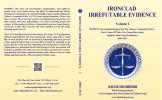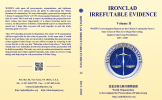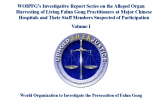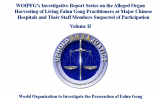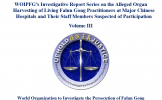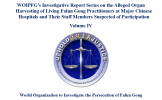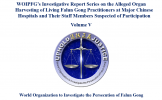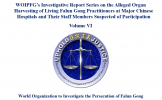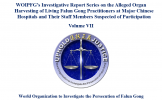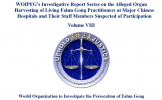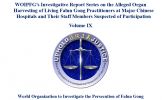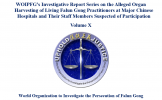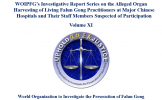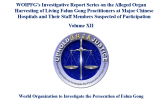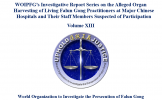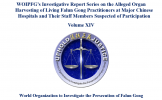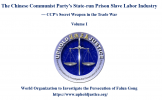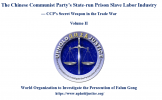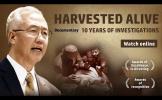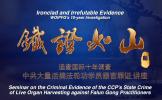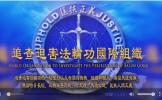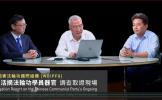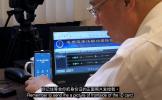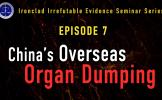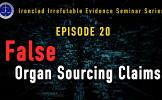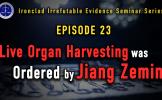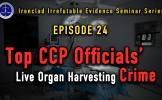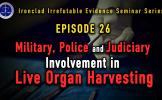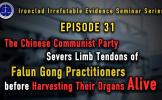Investigative Report on the Control of Overseas Chinese and the Implementation of Global United Front Strategy by the Chinese Communist Regime
Prologue
1. Chinese Communist Party (CCP)’s Global United Front Strategy
1.1 Chinese Communist leaders on “United Front”
1.2 Strategy change from the "world revolution" to the "patriotic united front" across the borders
2. Chinese Communist Party’s Overseas Forces in Action
2.1 CCP’s Overseas “Underground” Party Organizational Activities
2.2 Using Public Funds for Training Leaders of Overseas Chinese, Joint Activities and Summer Camps for Overseas Young Chinese
2.2.1 Overseas Chinese Leaders’ Training Class in China
2.2.2 Overseas “Friendship Associations”
2.2.3 Summer Camps for Overseas Chinese Youth and Teenagers
2.3 Overseas “Chinese Community Social Activities” Organized to Carry out Chinese Communist Party’s Messages and Objectives
2.3.1 CCP’s National Day Celebration
2.3.2 Overseas Chinese Patriotism Exploited by the CCP during the Beijing Olympic Torch Relay
2.3.3 CCP-controlled Activities against the Dissidents
2.4 The Overseas Chinese Communist Forces with “the right to vote” Is Forming
2.4.1 China Council for the Promotion of Peaceful National Reunification
2.4.2 Association of Chinese Scientists and Engineers
2.4.3 Fang’s Newspaper Empire
3. Major Tactics Used by the CCP to Control Overseas Chinese
3.1 Enticing Overseas Chinese Media to Becoming Part of the Chinese Communist Propaganda Vehicle
3.2 Chinese Communist’s “root effort” Projected to Nurture and Develop Its Power and Influence Overseas
3.3 Make Social Dignitaries and Luminaries the Target of United Front Work
3.4 Budget and Funding Established Specifically for the Overseas Unified Front Work
3.4.1 Upper/Elite Class Entertainment and Lobbying
3.4.2 Unified Front Propaganda Advertising and Media Budget
3.4.3 Overseas “United Social and Friendship Activities”
3.4.4 Dedicated Budget and Funding for the Overseas Chinese Culture “Education” (Subtle Brainwashing with Communist Party Cultural Messages)
4. Seeking and Gaining World Wide Resources through an Open Door Policy
4.1 CITIC (China International Trust and Investment Company) is the Largest Window to Attract and Utilize Foreign Capital
4.2 Increasing the Dependency and Reliance of Chinese Markets by Developed Nations to Attract and Draw Advanced Technologies and Major
Overseas Funding Historic Background of CCP’s United Front Work
Conclusion
References
Prologue
On April 9, 2008, the Beijing Olympics Torch reached San Francisco. This would be its only stop in North America. After a series of massive protests in the UK and France where the protesting crowds overwhelmed the pro-China supporters, the Chinese Communist regime began to mobilize through its embassy and consulates in the US. Virtually all available human resources in the San Francisco Bay Area Chinese Communities, Chinatown, as well as human resources from the neighboring areas were called upon to amass a huge supporting group. This was the first time the Chinese Communist regime openly demonstrated its will and power to mobilize large scale Chinese Communities while under the scrutiny of major US social groups and Western media. It also exposed the long-term effect of the Chinese Communists of organizing and controlling local Chinese Communities.
A well-known private intelligence analysis firm, Strategic Forecasting Inc, conducted an analysis on this special San Francisco incident in its “Terrorism Intelligence Report.” [1] This report aimed to comprehensively reveal the background factors of this incident in both theory and its practical operational perspectives.
The Chinese Communist Party (CCP) was founded by the Chinese Communists’ objective of a totalitarian, authoritarian dictatorship and the doctrine of Marxism. [2] As soon as they seized power in Mainland China, the CCP began its tyranny with the goal of brutally and systematically purging traditional Chinese values, moral conduct and civilization. This resulted in the unnatural deaths of 80 million Chinese people. [3] It also caused major damage to the social environment, natural habitat, and disrupted people’s lives. Even though the Chinese Communist Regime repeatedly proclaims how good the Socialist System is, how “great” the CCP is, the number of Chinese abandoning their homes and immigrating to other countries increases daily. The International Organization for Migration [4] and U.N. Secretary Kofi Annan [5] drew the same conclusion that “China is the country with the largest overseas immigrants.” According to historical records, the total accumulated overseas Chinese immigrants up until 1949 brinked 10 million. [6] However, up until 2005, overseas Chinese immigrants increased sharply to 35 million. [7] So in the short span of 56 years from 1949 to 2005, there were at least 25 million Chinese immigrating overseas, accounting for 2.5 times the historical total immigration population.
At present, 90 percent of the 30 million overseas Chinese immigrants and their descendants have adopted citizenships from their residing countries (foreign national Chinese). [8] But the Chinese Communist regime never let go of its grip to control these Chinese immigrants, [9] or ways to transform their ideology. They exploit and utilize them to expand the Chinese Communist sphere of influence in the international society. Under the leadership of the Overseas Chinese Affairs Office of the State Council [10] and with the cooperation of the Department of Consular Affairs of the Ministry of Foreign Affairs, [11] the regime has established a Chinese immigrant political strategy and procedures that specifically targeted the overseas Chinese. They have conducted systematic, long-term deceptive propaganda and indoctrination of Chinese Communist ideological concepts.
The regime has worked on exploiting Chinese immigrants’ sentimental emotions towards their homeland, confusing them and lumping together the notion that China and the CCP are the same, instigating Chinese immigrants to legitimize and act loyally to the Chinese Communist Party. The implementation of this strategy is carried out by the United Front Work Department of the CCP Central Committee. [13] The Office of Overseas Chinese Affairs of the State Council specifically emphasized, “Maintain the continuity of the work in overseas Chinese affairs,” requesting officials of overseas Chinese affairs to “identify, nurture and establish major targets” among 2nd and 3rd generation overseas Chinese, as well as new immigrants. [14] Even though the Chinese Communist’s activities of “overseas Chinese affairs” were not conducted in the Communist organizational forms, such political alliances formed overseas under the driving force of the Chinese Communist regime, with the purpose of “conducting work for Chinese Immigrants, Overseas Chinese and its Social Organizations” [15] being very similar to the then “Third Communist International” formed by the Soviet Communists. [16] Their purpose was to seek out representatives and to establish Communist branch offices in various countries. Such effort directly nurtures and establishes Chinese Communist influences inside the belly of other nations. Such political alliances have the same will as the Chinese Communist regime, exerting subtle and gradual influence on the value direction and national policy of residing countries through ideological infiltration and assault. In the eyes of the international society, the Chinese Communist regime is, quietly and without traces, seizing a controlling power of other nations beyond its own domain. Now, a huge network of political alliances, organizations, social clubs and administrative divisions under the control of the
Chinese Communists has been established within many countries. They have essentially become a nation within a nation among many countries.
1. The Chinese Communist Party’s Global United Front Strategy
The so-called United Front, according to the explanation of the CCP Central Committee United Front Department, “specifically refers to the political coalition of various social political forces (including various classes, strata, political parties, groups, and even ethnic groups, and countries, etc.) formed under some historical circumstances, based on common interest for a fixed common goal, under the theoretic guidance of Marxism, organized and led by the Chinese Communist Party.” [13] The united front is one of the “three magic weapons” of the CCP’s revolution, [17] and is an effective tool for the CCP’s expansion.
1.1 Comments on the United Front Work by the CCP Leaders
In 1939, Mao said in the first issue of “The Communists” that “The united front, the armed struggle, and party building are the three magic weapons of the Chinese Communist Party to defeat enemies in the Chinese revolution, three major magic weapons.” [18] “Without the united front, the revolution would not have succeeded. Even if it succeeded, it would not have been consolidated.” [19]
Deng Xiaoping once said soon after the CCP took power, “The united front is a concrete application of Marxism-Leninism’s strategies, tactics and principles.” [20] On August 15, 1979, Deng Xiaoping gave explicit direction to the 14th national conference on united front work: “The united front work is a task for the entire party, it depends on the entire party to do it. Party committees at every level should include the united front in their agenda.” [21]
On December 4, 2000, Jiang Zemin said at the 19th national conference on united front work, "The fundamental task of the united front work is to fight to win people’s hearts and gather the forces." [22]
On July 10, 2006, Hu Jintao said at the 20th national conference on united front work: "The united front is an important magic weapon of the Chinese Communist Party to govern and rejuvenate the country," "to consolidate and develop the broadest patriotic united front is an important, integral part of our party improving its ability to govern." [23]
1.2 Strategy Change from the "World Revolution" to the "Patriotic United Front" Across the Borders
In early 1966, the CCP thought the "world revolution" had come to a climax. On May 16, the Great Cultural Revolution began under Mao Zedong's call, aiming at complete destruction of traditional Chinese philosophy, morality and civilization. [24]
The CCP’s reckless forced exportation of “Mao Zedong’s Thought and the Cultural Revolution" caused 30 countries to have diplomatic conflicts with China, while 48 countries had established diplomatic or semi-diplomatic relations with China. [25] The isolation in the international environment forced the CCP to shift its strategy. On August 12, 1977, the CCP announced the end of “the First Proletariat Great Cultural Revolution,” which lasted for 11 years. [26]
On October 2, 1977, responding to the need to stabilize the CCP’s regime, and to improve its situation in the international community, Deng Xiaoping started a new channel of external expansion by saying "overseas relationships are a good thing, it can open relations from all aspects." [27] Those who used to be discriminated and persecuted because of their “ties with overseas” have now become “links and bridges” to the overseas targets of the CCP’s united front work.
On June 15, 1979, in his opening remarks to the 2nd session of the 5th National Political Consultative Conference, Deng Xiaoping said that a new alliance consisting of two kinds of “patriots” both in and outside of mainland China had taken shape. [28] This "patriots political alliance”, as called by Deng Xiaoping, consists of one alliance of the “democratic parties” under the leadership of the Communist Party, and the other by the “patriots” outside mainland China, including those in Taiwan, Hong Kong, Macao, and overseas Chinese.
In 1981, the CCP formally renamed its united front during this period as the "patriotic united front." [29] In May 1985, the Secretariat of CCP Central Committee required in its directive to strengthen the united front work to “boldly carry out united front work overseas." [30]
In June 1986, Deng Xiaoping personally met with more than 200 relatives of the "red capitalist" Rong Yiren from the United States, Canada, Australia, Germany, Brazil, Hong Kong, Macao, and other countries and regions. Deng told them that “this reunion of your family,” “is the sign of our nation’s unity and an exercise.” [31]
After drastic changes in Eastern Europe and especially after the collapse of the former Soviet Union, for fear of following the steps of the Eastern European Communist Camp, which had collapsed like a house of cards, the CCP issued on July 14, 1990 “Notice of the CCP Central Committee to Strengthen the United Front Work”. [32] This notice was sent to united front personnel at all levels in the entire country. It emphasized in the notice that the core of “the patriotic united front” is the leadership of the Chinese Communist Party, and demanded “to vigorously carry out the united front work overseas… to actively strengthen and develop connections with influential representative persons and groups, to carry out the work in a guided, organized, multi-channeled and diversified manner.
The CCP Central Committee United Front Work Department set up key topics for research and provided the outcome of such research as an important reference for the CCP central and local committees in their policy making regarding the work of the united front. [33]
Some results of the key research were included in the 2004 Blue Book of the CCP Central Committee United Front Work Department:
(1) "Cohesion of the Chinese nationality” as the soul and backbone of the “united front”;
(2) Enhance the attractiveness of the Chinese Communist Party as the national core and the attractiveness of the banners of socialism and patriotism;
(3) Focus on "cultural identity, patriotism to the country and hometown" to enhance the cohesion among noncommunist people in mainland China, Chinese people in Hong Kong, Macao and overseas. [34]
In early February 2007, the CCP Central Committee United Front Work Department published "Comments on implementation of the ‘cohesion project’ in the united front work (Trial),” [35] which specifically pointed out to “closely unite the members of the united front around the CCP." Tasks include:
(1) "Consolidate and develop the CCP-led multi-party cooperation in the political structure";
(2) "Hold high the banner of patriotism";
(3) "Continue to use those effective activities and carrier like 'memorial service for Yellow Emperor (Huang Di) in Huangling County', 'overseas outstanding youth gather in China', etc."
(4) “Strengthen the 'centripetal force' and direct Hong Kong, Macao and overseas Chinese inward towards their motherland” by giving full play to the “leading role” of the “advanced socialist culture” and “promoting Chinese language education overseas.”
These contents show that the research outcome and tasks of the united front work by the CCP aim to transform to transform the Chinese people’s national identity into the identity of the CCP.
2. Chinese Communist Party’s Overseas Forces in Action
As early as the Sino-Japanese War, the CCP established the branch offices of the Communist Party and various organizations. [36] Under the CCP’s incitement, overseas Chinese agreed with the CCP’s political view and followed its order. Especially after October 19, 1950 when the CCP’s army combated with the UN army in South Korea in order to support Kim II Sung, [37] many countries began to suspect the Chinese as “the fifth garrison exported from the Communist Party.” On February 1, 1951, a resolution was passed during a UN conference, in which it condemned China for invading North Korea. This later caused the large-scale “anti-Chinese” wave in Malaysia, colonial England, Thailand, Burma, and Vietnam. The Overseas Chinese Affairs were suddenly isolated and experienced a difficult position in the international society. [38] In 1952, being anxious to improve its position and wash off the image of an invader, as well as to protect the long-term survival and development of the overseas CCP’s forces in the residing countries, the CCP made major strategic adjustments. On the surface, it cancelled the CCP’s overseas branch office “Overseas Chinese Party” that conducted the activities publicly overseas [39]. In 1966, the CCP's forceful export “revolution” once again faced strong resistance from international society. The CCP once again changed its strategy and became active on the international stage with a more deceiving mask.
2.1 CCP’s Overseas “Underground” Party Organizational Activities
The SINOHYDRO Corporation is a large international enterprise directly under the control of the Central and State-owned Assets Supervision and Administration Commission of the State Council. [40] On August 24, 2006, the tentative Party committee of the company issued “Guidance for Reinforcing Party Development Work in the Overseas Operating Units.” The 18th rule in “The Principles of Party Activities for the Overseas Operating Units” states, “When corporations, international enterprises and their subsidiary companies set up their overseas operating units, they need to simultaneously establish a Party organization to insure that wherever there is a management project and personnel, there is a Party organization.” The 32nd rule states, “All overseas Party organizations in the overseas operating units must report to and be under the leadership of the Party Committee of the Chinese Embassy in that country.” The 33rd rule states, “When establishing Party organizations, overseas operating units need to conform to the situations of the residing country. It is not advised to openly hold large-scale activities or conferences in the name of the Party organization, nor can the internal information of the Party be exposed. One cannot accept foreign media interviews in the name of the leader of the Party organization.” [41]
China National Oil & Gas Exploration and Development Corporation (CNODC): By the end of 2004, this company had 31 overseas companies with 12,000 staff members in total, working on 45 contract projects in 21 countries in four continents. With the principle of “wherever the team is, the Party organization should be established and its activities should be initiated,” the tentative Party Committee of this company had established Party Committees in Sudan, Venezuela and Kazakhstan, and a joined Party General Branch in Indonesia. It has five Party general branches and 39 Party branches. The tentative Party Committee also made every effort to recruit the Party members from excellent technical personnel and management staff. It held a total of 28 training sessions for Party member candidate activists with 114 staff and youths recruited to the Party members. The number of the Party members increased to 662 in 2005 from 50 in 1997, a number comprised of 56.7% of its total staff. [42]
The China Geological Engineering Corporation (CGC) is a central enterprise that primarily deals with international contract projects. It has management departments, project departments and offices in nearly thirty countries in Asia and Africa. It has 115 overseas Party members. Since June 20, 2004, the CGC Party Committee has started to “thoroughly investigate the number and distribution of overseas active Party members,” “so that overseas active Party members have unified guidance although they stay far away from homeland physically;” “Conforming to the requirement of wherever there are Party members, there are Party organizations; wherever there are Party organizations, there are systematic organization agendas. Establish and strengthen the Party branch offices and ensure every Party member is under the management of the Party branches.” [43]
On June 30, 2006, the business division of the Chinese Embassy in Cote D'Ivoire held Party organizational meeting for China-funded enterprises, celebrating the eighty-fifth anniversary establishment of the CCP. They organized Party members from various companies including the Bridges Company, business trade center, overseas pharmaceutical companies, the Shanghai Textile Company, the Tianshi International as well as Xinhua News Agency, and Teachers Group to Aid Cote D'Ivoire. The economics and commercial consul stated regarding the conduct of overseas Party members, “Every Party member carries the glorious historic mission and manifests the policy of the Party,” “with your own act to practice the Party Central Committee’s important strategic plot of ‘stepping out’.” [44]
2.2 Using Public Funds for Training Leaders of Overseas Chinese, Joint Activities and Summer Camps for Overseas Young Chinese
Training for Leaders of Overseas Chinese Community
Zhou Lishuo, Reporter from China News, reported from Guilin City on May 29, 2006: “In order to encourage and nurture more overseas Chinese youth to serve in Chinese communities, the Office of Overseas Chinese Affairs under State Council invited over 30 young to middle aged Chinese from Thailand, Malaysia, Singapore, Indonesia, Australia, U.S., France, U.K., and Holland to attend the third session of “Advanced Training for Young Generation Overseas Chinese Entrepreneurs” in 2006. The students attending the training session all assume important roles in overseas Chinese associations in their respective countries. Most of them are children of renowned Chinese businessmen or leaders of these associations. They are financially well off, and have the enthusiasm to serve the Chinese community. These people have great potential as the future leaders of overseas
Chinese communities, so they are really worth teaching.” [45]
According to news released from the Office of Overseas Affairs under State Council on June 12, 2007, the Office of Overseas Affairs in Zhejiang Province “hosted Training Classes for Young Overseas Chinese Community Leaders for three consecutive years since 2004, with great support from Chinese Embassies and Consulates in other countries, in order to enhance the training of overseas association leaders and to maintain the pro-China source outside China. Since 2004, 89 young or middle aged Chinese leaders from Europe, Australia, Africa, South America and North America attended the training. Thus, we were able to enhance the training and the guidance for these community leaders….” [46]
In the afternoon of August 17, 2007, after the completion of the Fourth Training Session for Leaders in Overseas Chinese Community, the graduation ceremony was held in the Diaoyutai State Guest House. The Director of the Office of Overseas Affairs under State Council, Li Haifeng, Deputy Director Xu Yousheng, and Vice President of the National Committee of the People's Political Consultative Conference attended the ceremony. Luo Haocai personally handed the graduation certificates to the students. There were 43 students in this training session. They were from Canada, U.S., Mexico, Panama, Venezuela, Brazil, Argentina, Peru, Chili, Australia and New Zealand. Luo Haocai stated that hosting such training sessions was “an innovative strategy” that the Office of Overseas Affairs adopted based on the current situation of overseas affairs, and it will help with the development of the work for the overseas Chinese affairs. [47]
In the “Reform Plan to Maintain the Advanced Features of Communist Party Members” in Huzhou City, Zhejiang Province, it stated: “Strengthen our connection to young generations amongst overseas Chinese; try our best to host the second provincial training session of overseas association leaders in Huzhou City.” [48] On May 29, 2007, 37 overseas Chinese community leaders from 15 countries whose hometown was Rui’an came back to Rui’an to attend the First Training Session for Overseas Chinese Community Leaders. The content taught at the training session was “custom-made” for these leaders. In addition to five classes on interpersonal relationships, management of personnel, international political analysis, foreign affairs policies and rules, etiquette in business, quality for community leaders and community management, there were also classes introducing the economic development in Rui’an. According to responsible persons in the Office of Overseas Affairs at Rui’an, they “spent more than 100,000 Yuan to host this free training session for these overseas Chinese community leaders.” [49]
The following is a partial list of overseas Chinese community leaders who had been to such training sessions in China between 2004 and 2007.
Xu Jiyou (male)
Xu is President of the Association of Overseas Chinese from Guangzhou City in U.K. He was born in Dongping Village, Baiyun District of Guangzhou City. He later immigrated to the U.K. and was involved in a restaurant business. In 2004, he took the initiative to establish the Association of Overseas Chinese from Guangzhou City in the U.K. and he took on the role as the president.[50] He had attended training for overseas Chinese community leaders organized by the Office of Overseas Chinese Affairs under State Council. There are more than 300 members in the Association. Most members came from Baiyun District, Guangzhou City. Currently, there are more than 2,000 Chinese from Baiyun District of Guangzhou City living in the U.K. Most of them live in Manchester. [51]
Yang Chunlai
Yang is the head of the Association of Chinese Scientists and Engineers (ACSE). He left Beijing in 1990 to migrate to the United States. ACSE was established two years later in Chicago, and was formally registered with the state of Illinois. The association has members in over 20 states, and its headquarters is based in Chicago. [52] In May 2005, Yang went to Beijing for training with other leaders of overseas Chinese organizations. [53] On June 21, 2007, at the 4th Annual World Overseas Chinese Community Association Friendship Conference, hosted by the Office of Overseas Chinese Affairs of the State Council, and the China-Overseas Exchange Association, [54] Yang gave a speech, saying that "one needn’t return to one's country to serve one's country," and "we now have 1,500 members, with roughly a third of them possessing U.S. citizenship. Through our members' relationships with friends and family members, I estimate that we can influence 500 ballots." (2008 is the Presidential election year in the United States) [55]
Li Guosheng
Li, who hails from Yuyao City of Zhejiang Province, is the Secretary-General of the Singaporean overseas Chinese organization, Association of Native Chinese. In 1993, he settled down in Singapore with a position in Singapore's United Morning News. He also offers service to the Singaporean overseas Chinese organization, Three River Guild, by assisting the group's chairman, Shui Mingzhang. In May 2001, Li became Secretary-General of the Association of Native Chinese, which has 400 Singaporean Chinese as its members. On July 4, 2006, when Li attended the Third Annual Study Session of Zhejiang Province for Young and Middle-Aged Leaders of Overseas Chinese Communities, Chen Xiaolong, head of the Yuyao City Overseas Chinese Affairs Office, made a special trip to Hangzhou to visit him. [56]
Jiang Weimin
Jiang is currently the president of the Chinese Association for Science and Technology in Utah (CASTUT). In 2007, he went for training at the Fourth Annual Study Session for Young and Middle-Aged Leaders of Overseas Chinese Associations sponsored by the Overseas Chinese Affairs Office of the State Council. [57] CASTUT is described as a non-political, non-profit professional organization established in New York in 1992, and registered in the United States. CASTUT was established at the end of 1996. Its members are mainly Chinese professionals in the fields of science and technology, engineering, law, finance, culture and education, and professionals in other areas who reside in the United States. [58]
Zhang Xieling
Zhang is the President of the Northeastern Chinese Association of California, President of the U.S.-based Sino-U.S. Industry and Commerce Federation, President of the Northeastern Chinese Overseas Friendship Association, and the Managing Director of the International Haitong Company of America. [59] Under the direction of the Overseas Chinese Affairs Office of the Municipal Government of Harbin City, he developed the Harbin City Overseas Exchange Association (HOEA), and was the "Specially Invited Overseas Director." [60] In 2007, he went for training at the Fourth Annual Study Session for Young and Middle-Aged Leaders of Overseas Chinese Communities, hosted by the Overseas Chinese Affairs Office of the State Council.
Zhang Yue
Zhang is the Vice-President for the Association for Promotion of the Peaceful Unification of China of the Northern Territories of Australia. In 2007, he went for training at the Fourth Annual Study Session for Young and Middle-Aged Leaders of Overseas Chinese Associations, hosted by the Overseas Chinese Affairs Office of the State Council. [61]
In addition, a large number of overseas Chinese from all over the world have received the training for “Overseas Chinese Leaders” given by the departments at all levels of the Chinese government. For detailed information, please contact World Organization to Investigate the Persecution of Falun Gong.
Getting Together for Overseas Chinese
According to Huasheng News from Hangzhou City, one of the overseas Chinese online newspapers, the Overseas Chinese Affairs Office in Huangzhou held a directors’ meeting on February 28, 2006. On behalf of the Communist Party Committee of this Office, Director Chen Shulong made a plan for five key projects in 2006: “Actively launch networking activities with overseas Chinese, continuously increase the pro-China forces abroad, organize networking conferences for overseas Chinese who were originally from Hangzhou or Hangzhou descendents, host educational sessions for overseas young Chinese leaders, and establish relationship with Chinese organizations in South America and Africa where we do not have much resource of overseas Chinese affairs. [62]
The Overseas Chinese Affairs Office of Guangzhou City made a strategic working plan on July 10, 2006 that included: (1) Support and help new overseas Chinese associations to grow and to blend into mainstream society. Train a group of young to middle aged leaders, helping them to gradually become the leading force of local overseas Chinese communities; (2) Invite 20-30 key persons from overseas to come to Guangzhou to attend
activities aimed at establishing friendships every year with public funds. Also, invite 10-15 capable, influential young to middle aged association leaders to visit Guangzhou with public funds. Organize summer camps for juniors from overseas and Hong Kong, Taiwan, and Macao with public funds. [63]
Summer Camps for Overseas Young Chinese
In order to strengthen its control of overseas Chinese, the CCP uses state funds to organize a large number of summer camps for overseas young Chinese and for young Chinese from Hong-Kong, Macao and Taiwan. [63] In 2006 alone, China’s Overseas Office collaborated with local overseas offices to hold many large-scale “Root-Seeking Summer Camps in China” activities and other cultural activities, attempting to impose more influence
on young Chinese Americans. More than 11,000 junior Chinese Americans from 61 countries and regions participated in these activities, a shocking number and scale. [64]
2.3 Overseas “Chinese Community Social Activities” Organized to Carry out Chinese Communist Party’s Messages and Objectives
According to statistics, there are roughly 10,000 overseas Chinese organizations around the world. [65] In examining the contents and nature of these organizations' activities, we see the scope of the CCP's control over overseas Chinese communities.
2.3.1 CCP’s National Day Celebration
The CCP always pays special attention to the annual “National Day Celebration”(the date when the CCP came to power in China, “Oct 1” for short below), including a reception and “Flag-rising Ceremony” organized by the Chinese embassies or consulates around the world. According to incomplete statistics, 36 such kind of receptions were held in 2006 in countries like Canada, US, Britain, France, Holland, Jamaica, Germany, Italy, Slovakia, Egypt, Japan, North Korea, South Korea, Thailand, Vietnam, Burma, Australia, New Zealand, Mexico, Venezuela, Iran, Nepal, Afghanistan, etc.; [66] and in 2007, that number increased to at least 80. [67] The description on Chinese government's gateway website (www.GOV.cn) marks the three basic characteristics of those “Oct 1” activities as - “to display power,” “to demonstrate cohesive force” and “to make good use of appealing power” [68] “Since early September, various departments of the Chinese embassies and consulates started to send out 'Oct 1' reception invitations to local government officials, organizations, foreign delegations, overseas Chinese groups, China funded companies, foreign correspondents, and so on.” [69]
Some reception scales were quite large. On the evening of September 25, 2006, the Chinese Consulate General in Los Angeles held an “Oct 1” reception at the Hilton Hotel where 2000 people were in attendance, including California state officials, council members, overseas Chinese, Chinese students abroad and representatives of China funded companies, etc. [70] On the day of the celebration, in addition to a reception and entertainment, a “Flag-rising Ceremony” is usually conducted as well. While attending their activity, the Chinese Consul General in New York Liu Biwei once urged the local Chinese community to raise the “five-starred red flag.” [71] He claimed that “it was a wise choice to follow this trend of social development;” [72] the “five-starred red flag,” “your name is more important than our lives.” [73]
In the morning of September 23, 2006, the Chinese Consul General in San Francisco, Peng Keyu presided in person the “Flag-rising Ceremony” at the Portsmouth Square in Chinatown for the 57th anniversary of the CCP ruling China. Vice Consul General Wang Xinping, consuls Tong Xuejun, Yan Jinlin and vice consul Chen Xiaoyi arrived together. Dozens of community leaders including president Zhong Shaoyuan and the first vice president of the Chinese American Association of Commerce (CAAC) Huang Xihai, president Huang Huaxi and vice president Liu Jianfa of the National Association for China's Peaceful Unification (NACPU), consultant Bai Lan of the Chinese Chamber of Commerce (CCC), manager Li Biao and deputy manager Huang Ronghui of Ying On Labor & Merchant Association, and consultant Wu Guobao of Sam Yup Benevolent Association, as well as over 200 overseas Chinese attended the ceremony. Chi Honghu, executive chairman of the People's Republic of China (PRC) National Day Celebration Committee said that due to the “gradual increase of overall state power of China, many traditional Chinese American associations have started to hang the 'five-starred red
flag' one after another.” In the evening of that same day, celebration dinner parties were held concurrently at the Far East Cafe and Four Seas Restaurant in San Francisco’s Chinatown. More than 1000 community leaders and members were present. [74]
2.3.2 Overseas Chinese Patriotism Exploited by the CCP during the Beijing Olympic Torch Relay
According to China News Agency 's April 17 report from Beijing, the director of State Council's Overseas Chinese Affairs Office, Li Haifeng said, “From pictures on TVs, newspapers and Internet, we can see a big crowd of overseas Chinese protecting the “Olympic Torch” with five-starred red flags flown everywhere.” [75] In his talk of less than 130 words, Li Haifeng repeatedly emphasized that it was a voluntarily action of overseas Chinese to “support the Olympics” and “condemn the independence of Tibet”. However, from the following CCP central government level news reports, we know that the large scale action of overseas Chinese was not at all out of their hearts. Instead they were organized activities by the CCP consulates and associations under their control. The so-called patriotism of overseas Chinese was in fact manipulated and taken advantage of by the CCP and has thus become a tool for the CCP in expressing its will.
Let's look at the two stops of the “Beijing Olympic Torch Relay (BOTR)” in San Francisco and Australia:
(1) On April 9, the BOTR arrived at San Francisco, USA
China News Net reported on March 15 that according to World Journal in the U.S., the Chinese Consolidated Benevolent Association (a.k.a. Chinese Six Companies) and the Chinese Consulate General in San Francisco co-initiated a signature campaign among Chinese communities to welcome the Beijing Olympic Torch (BOT). They planned to send in the signatures to the consulate later on. [76]
China News Net correspondent Wu Zhuoming reported on April 3 that they have learned that the Chinese consulate had sent letters to all Chinese organizations in the Bay Area to request head counts for April 9. CAAC president Zhong Shaoyuan said that his organization had been preparing for the welcome activities of the BOTR. On April 9, Zhong Shaoyuan told the VOA reporter in an interview: “CAAC has arranged for 150 groups to welcome the torch.” [77]
China News Agency correspondent Zhang Wei reported from San Francisco on April 8 that Liu Jianmin, president of NACPU in the greater Los Angeles area, arrived in a bus with over 50 people that afternoon. They were representatives of traditional Chinese American associations in the Los Angeles area. Zhang Sujiu, chairman of Southern California Federation of Chinese Organizations (SCFCO) said that many groups including SCFCO, US Beijing Union, Los Angeles Tsinghua Alumni Association, Los Angeles Northeast Folk Association, Los Angeles Jinhua Folk Association, etc. have all sent representatives to San Francisco to “protect the voyage” of the BOTR. [78]
According to China Press USA, CAAC consultant Chi Honghu said that CAAC has prepared 10 thousand small US national flags and five-starred red flags, 10 thousand Olympic flags and 10 thousand T-shirts with the Olympic emblem (i.e. five interlocking colored rings). [79] The Chinese Senior Association from the Silicon Valley took the 30 big buses from the Silicon Valley early in the morning of April 9, and came to San Francisco to welcome the torch. Starting from 5:00 am, more than 90 arranged buses transported people from all over the Bay Area to the starting and ending points of the torch relay route in San Francisco. [80]
Doctoral student Tang Yuchun is from the Medical School at the Shandong University. He had just arrived at UCLA to study one year in the Neuroscience Department. He said that the Chinese Students and Scholars Association (CSSA) in UCLA have organized the “Escort activity for the BOTR in San Francisco”. Along with two other schools in Los Angeles, about 100 Chinese students and scholars went to San Francisco to participate.
He also mentioned that they were given the task to occupy favorable sites so that those advocating independence of Tibet would not have a chance to get in. [81]
On April 13, Chinese Consulate General in Los Angeles, Zhang Yun held a reception at his Consulate for 300 people of local communities and schools who had gone to San Francisco to welcome the Olympic torch. The vice consuls general Huang Xiaojian and Xu Zhaoyou, as well as each department head also attended. In his welcoming speech, Zhang Yun said: “We have traveled day and night to San Francisco, in order to protect the BOTR...You have bravely stood at the forefront, without any fear, using your flesh body, five-starred red flags and five ring flags to ensure the safe relay of the torch.” [82]
(2) The Beijing Olympics torch relay arriving at Canberra, the capital of Australia on April 24, 2008
April 11, 2008, a group named "4.24 Canberra Defend the Olympic Torch activities (Melbourne) leading group" published on Sina website (sina.com.cn) a “4.24 Canberra Olympic Torch Defense Activity Coordination Plan”, in which it publicly announced the regular meetings on April 15, 20 and 22 to be held at the Chinese Consulate General and its education section, respectively, to report the progress on the coordination of the activities organization, arrange and plan out organizational tasks, and that the Chinese Consulate General and education section would send staff to coordinate and support them. [83]
The Australian Chinese Youth Exchange Promotion Association (ACYA) which claims to accept support from the Chinese Embassy to Australia issued an "Invitation to the Beijing Olympic Torch Relay in Australia Supporters League" on April 12, 2008 in China's largest portal web site, "Sohu blog" (blog.sohu.com). The invitation stated that "the organizers would provide free Sydney - Canberra round-trips by bus, free food (breakfast and lunch), and that the ACYA would provide Olympic souvenirs and activity certificates" as incentives to encourage people to participate in the "supporters league" to welcome the Beijing Olympics Torch in Canberra. [84]
According to the "Australian New Express Daily", which is under the CCP’s “Yangcheng Evening News newspaper group," [85] on April 19, 2008 they reported that they took the lead and launched the "support torch relay, red flags cover Australia" activity, ordered 1000 “five-star red flags” from multiple factories in Guangzhou, and express mailed the flags to Canberra before April 24 and “donate them to local overseas Chinese to escort the Olympic torch.” [86]
Xinhua News Agency, Beijing reported on April 17: "The Chinese Consulate in Sydney disclosed that the number was 5,000 people that went to the capital Canberra to protect the torch." Sydney Chinese organizations have formed a 400-member national flag square, and other small Chinese organizations have also formed their own national flag square. One of the activity planners, the vice president of Australia Chinese Youth Chamber
of Commerce Suo Jiang said, “We want to dye the sky of Canberra red with the five-star red flags.” [87]
2.3.3 CCP-controlled Activities against the Dissidents
In April 2001, over 50 Chinese organizations in Canada, under the secret direction of the Chinese embassy and consulates in Canada, jointly sent a letter to then-Canadian Prime Minister Jean Chretien, urging the Canadian government to immediately take measures to restrict the community activities of Falun Gong, which has been legally registered in Canada. [88] Chen Yonglin, a former political consul of the Chinese Consulate-General in Sydney, who defected from the CCP, revealed on June 4, 2005 that the CCP sent out notices about this letter to all of its embassies and consulates around the world, stating that the Chinese Embassy and Consulates in Canada performed well and achieved good effects, and that all other embassies and consulates should learn from them. [89]
Sydney Chinatown community leader King Fong [90] said in an interview with Sydney Morning Herald on February 7, 2005, "We have had this issue before us for the past few years, and there are a lot of issues involved. But if we support Falun Gong, and they are banned in China, it is realistic to say that China could affect some of our trade and cultural concessions. We locally don't want to play politics ... but we also don't want to harm our relationship with China.”[91] (Sydney Morning Herald, "Row over Chinese new year parade" by Darren Goodsir February 7, 2005
http://www.wwrn.org/article.php?idd=1922&sec=25&cont=5)
The following are a few examples of the above-mentioned overseas Chinese organizations' activities to illustrate the issue:
United Chinese Association
According to a February 15, 2001 article on China News Service, a delegation of the European Federation of Chinese Organizations (EFCO) arrived in China in February 2001. Head of the delegation Hu Yuanshao reported to Luo Haocai, Vice Chairman of the 10th Chinese People’s Political Consultative Conference (CPPCC) National Committee on EFCO’s active role in suppressing Falun Gong, among other activities. According to Hu, EFCO grew from 26 organizations in 10 countries in 1992 to more than 200 organizations in more than 20 countries in 2001. [92] June 22, 2001, Liang Guanjun, President of the United Federation of Chinese Associations—Northeast US said during a CCTV interview, “We were the first overseas organization to step forward and oppose Falun Gong. We held five anti-Falun Gong rallies. Once, we confronted with them in the street, we organized counter protests when they had a parade. We did an outstanding job.” [93]
The United Federation of Chinese Associations in Northeast US was formerly named “New York Federation of Chinese Associations” and was established in New York in September 1990. [94] The current name was adopted in 2003. Liang Guanjun and Chen Qingquan are both presidents of the federation. According to the Shanghai Overseas Chinese Affairs Office, members of the federation did “vast amounts of work” in fighting Falun Gong” etc., “[they are] the backbone on which we rely for our work with overseas Chinese and diplomatic relations.” [95]
Global Chinese Anti-Cult Association
The Global Chinese Anti Cult Association was founded in Madrid on October 15, 2002 with members from various Chinese organizations in Spain, and its mission is to “carry out persistent and relentless struggles against Falun Gong.” [96]
Chinese Students & Scholars Association
The Chinese Students & Scholars Association (CSSA) consists of students and scholars from Mainland China. In 2000, CSSA was present in 12 countries with 109 chapters in the US alone. [97]
Many CSSA chapters frankly reveal in their mission statement or contact information on their websites that they operate under the guidance of the Chinese Consulate or Chinese Embassy. [98] Education counselors and consuls from embassies and consulates directly control or provide “action plans” to CSSA as advisors to the organization. [99] For example, the New York University Chinese Culture Club (NYUCCC) posted a forum on its overseas website on June 8, 2007 to collect signatures to protest against the Global Classical Chinese Dance Competition held by New Tang Dynasty Television (NTDTV), a non-profit pro-Falun Gong broadcasting station. [100] On June 17, 2007, CSSA at Columbia University published a web letter to support NYUCCC’s signature form, along with nine articles that slander and attack Falun Gong. All of the articles had links to the Chinese Embassy. [101]
Many of CSSA’s anti-Falun Gong activities were held inside Chinese consulates. For instance, CSSA members from Houston held an anti-Falun Gong forum at the Chinese Consulate in Houston in February 2001. [102] Cheng Xusen, who works for CSSA-Sunderland, wrote an article that mentioned how CSSA worked with the consulate to carry out anti-Falun Gong activities. [103] On May 26, 2007, the Education Office at the Chinese Consulate General in Houston held a discussion forum with CSSA presidents from Louisiana and Texas. The CSSA presidents from those two states reported their “achievements” in “suppressing the room for hostile force activities” to consulate officials. [104]
Chinese embassies and consulates provide funding for CSSA. Article 19 of the “Tentative Measures on Implementing Financial Responsibilities at the Education Section of Overseas Embassies and Consulates", issued by the Ministry of Education of China states, “‘Propaganda Fund Disbursement’ is specified, whereby the Education Section of overseas embassies and consulates are required to "follow regulations and allocate funds for student social activities" each year. At the beginning of the year, the students’ associations should submit a detailed budget, and by the end of the year, actual expense reports to the Education Section." [105] The detailed content of this section about the CSSA serving as the CCP oversea agents was published by WOIPFG on June 22, 2007, “Investigation Report on CSSA Acting as CCP Oversea Agent”
(http://www.upholdjustice.org/index2.php?option=content&task=view&id=172&pop=1&page=0)
2.4 The Overseas Chinese Communist Forces with “the right to vote” Is Forming
2.4.1 China Council for the Promotion of Peaceful National Reunification
China Council for the Promotion of Peaceful National Reunification (China Council in short) was formed on September 22, 1988 in Beijing. According to the Xinhua News Agency, the mouthpiece of the CCP, this "is a [non-government] group formed by those in favor of the peaceful reunification of China from all sectors of civil society." [106] The president’s positions were held by leaders of the so-called democratic parties [107] who “have accepted the leadership of the Chinese Communist Party as pre-requisite, and have participating party status.” [108] From September 27, 2004, this association was directly controlled by the CCP Central Committee. The current president is Jia Qinglin, a member of the Standing Committee of the Political Bureau of the CCP Central Committee, and chairman of the political consultation National Committee. The vice president is Liu Yandong, the head of the United Front Work Department of the CCP Central Committee. [109] The China Council members include 60 people who are "overseas Chinese." [110] Currently there are at least 130 branches set up among overseas Chinese in over 80 countries in five continents.
The tasks and missions of the China Council overseas are clear; one is to “blend into local high-level politics”, and the second is to “influence the mainstream society.” [111] Below is an excerpt of internal work reports by the presidents of the China Council on how to make the international society have the same voice as the CCP:
North California Association for the Promotion of China’s Peaceful Reunification
Honorary President [112] Florence Fang (Fang-Li Bangqin) said, "The United States North California Association for the Promotion of China’s Peaceful Reunification has two big features, one is that our members have lived in the United States for a long time, and have actively participated in voting in the United States, and are familiar with local U.S. officials." [113]
San Francisco-elected U.S. Congresswoman, House of Representatives Speaker Nancy Pelosi and others who introduced House Resolution 1077 on April 3, 2008, which calls on the government of the People's Republic of China (PRC) to end its crackdown in Tibet and to begin a dialogue without preconditions with His Holiness the Dalai Lama to address the legitimate grievances of the Tibetan people and provide for a long-term solution in Tibet. H. Res. 1077 also calls on the Chinese government to allow independent international monitors and journalists to access Tibet for investigation, and to release all Tibetans who are imprisoned for nonviolently opposing the Chinese government policies in Tibet. H. Res. 1077 calls on the U.S. Department of State to reconsider its decision not to include the PRC among the group of countries described as "the world's most systematic human rights violators," etc. [114] Targeting at this resolution, Li Nianci, the president of Northern California Council for Promoting a Peaceful Reunification of China, called close to 100 social group leaders to write to Pelosi’s office so as to pressure Speaker Pelosi to support the CCP; otherwise, they would mobilize the voters to “speak with their votes” to affect Pelosi’s reelection on November 8, 2008. [115]
Korean-Chinese Association for the Promotion of China’s Peaceful Reunification
Vice president Piao Yang said, “to grow and strengthen its own power, the South Korean Association for the Promotion of China’s Peaceful Reunification focused on three main directions: the Korean mainstream society mainly consisting of political community, speech sector, and civic groups, the elite group among Korean businessmen, and Korea's new Chinese immigrants forces. With the promotion and participation of our association, more than 20 members of the South Korean Congress and more than 30 media officials initiated and established a China forum in the Congress. These people are very influential in South Korea’s politics."
Chicago Chinese American Alliance for China’s Peaceful Reunification (CAACPR)
The Chairman of CAACPR, Mr. Wang Yonggao, announced a 2007 plan to conduct a survey on Chinese-Americans’ opinion on opposing Taiwan’s independence and advocating the reunification between China and Taiwan. He said the survey would be conducted by a contracted professional research firm in the U.S. Mainstream America will pay attention to the statistics and thus understand Chinese-Americans’ shared wish for the reunification of Taiwan and China, said Mr. Wang. Conduct a survey on the American people on what the U.S. will do if a war breaks out between Taiwan and China? Once the survey is completed, CAACPR may start lobbying on the Capitol Hill, said Mr. Wang.
Association for Promoting China-US Relations
Chairman Mr. Wang Shengwei said, “Think tanks are policy advisors to the U.S. government. They play a very important role; hence, we must pay full attention to the think tanks and we must actively reach out to them. Other than overseas Associations for China’s Peaceful Reunification reaching out to Chinese communities around the world, every person and every organization must do his best in playing a diplomatic role to bridge China and his country of residence. Doing such work overseas requires an approach acceptable to the country. We must blend in and influence local mainstream society.”
Association for the Promotion of China’s Peaceful Reunification in Central and Western Brazil
Chairman Mr. Song Nanping said, “We have a superior advantage because we have influence over the local politics at a high-level.”
China's Peaceful Unification Promotion Association of Victoria, Australia
This organization was founded in March 2005. Chairman Mr. Chen Jing said, “In terms of influencing mainstream society, we just had a Chinese mayor in Victoria join our association. We even escorted him to visit China.” [116]
2.4.2 Association of Chinese Scientists and Engineers [117]
On June 21, 2007, Mr. Yang Chunlai, Chairman of The Association of Chinese Scientists and Engineers-USA (ACSE), made a speech at the Fourth Friendship Meeting of Overseas Chinese Organizations. Yang began by summarizing the Chinese Communist regime’s instructions on how overseas students should “make contributions to their motherland.” Years ago, the Chinese Communist regime stressed the importance of overseas Chinese students returning to China to “serve the country.” Years later, the instruction changed: “Returning to China isn’t the only way to serve the country.” Presently, the instructions are to “blend in with local mainstream society” and “actively participate in politics in your country of residence.”
In an interview with a reporter from Chinaqw.com.cn, Yang Chunlai revealed that when Vice Chairman of the National Committee of the Chinese People’s Political Consultative Conference, Luo Haocai, led a group of representatives to the U.S. for a visit, Luo specifically asked about the current progress of Chinese blending in with mainstream society in the U.S. Luo also emphasized the importance of having Chinese “actively participate in politics,” said Yang.
Yang Chunlai added, “There will be a presidential election next year (2008). Scientists, engineers, and professionals should take this opportunity to further expand ACSE’s influence over mainstream society in the U.S. We have about 1500 registered members, and one-third of them have become U.S. citizens. With their network of friends and family members, we can influence an estimate of 500 voters.” [118]
2.4.3 Fang’s Newspaper Empire
Fang-Li Bangqin (Florence Fang, maiden name Li) was born in Hanchuan, Hubei Province, China. She moved to Taiwan in 1949. In September 1960, she immigrated to the U.S. with her husband Fang Dachuan and settled down in San Francisco, where she started working part-time. Now she owns a news empire of eleven English newspapers. She is currently president of PanAsia International Investment Ltd., honorary chairman of Northern California Association for the Promotion of China’s Peaceful Reunification, and the head of her news empire.
The Rags-to-Riches History of Fang Li Bangqin’s News-Media Empire
In 1979 Fang founded “Asian Week” targeting readerships of North American Asians. Eight years later, Fang purchased the community newspaper “The Independent.” [119]
In 1980, Shanghai and San Francisco formed the first Sino-US Sister City. Right after the crackdown of the prodemocracy student movement by the Chinese Communist regime (Tiananmen Square Massacre), the then Shanghai Mayor Zhu Rongji visited San Francisco (1990). According to records of the United Front Work Department of CCP Zhejiang Provincial Committee: “The then San Francisco Mayor was Art Agnos; he was very rude, and he criticized China in front of Zhu. The exchange between the two cities stopped because of this. In 1991, Fang commanded her newspaper to pull an all-out effort to support candidate Frank Jordan to defeat Agnos in the election to become the new mayor. After Jordan won the election, Fang told Jordan that the time was right to renew the friendship with Shanghai. Jordan wrote a letter that was hand delivered by Fang’s second son and his envoy to the then Shanghai Mayor Huang Ju. They told Huang Ju that the new mayor welcomed him to San Francisco. Later when Huang Ju visited San Francisco, he made friends with Fang.” [120]
In May 1991, as a representative of San Francisco, Fang attended the National Political Leaders Conference at the White House. At that time, the U.S. Congress was debating whether to grant permanent normal trade relations (PNTR) to China. Since 1990, the U.S. Congress investigated the human rights condition in China while debating each year in May whether to grant PNTR status to China. This debate continued until 2000 when President Clinton decided to grant China permanent PNTR status. [121] Fang argued that “Politics and Economics should be separated from one another,” and brought the signatures of several thousand merchants and businessmen who supported granting China PNTR, and demanded that PNTR status be granted to China. [122]
In April 1992, not long after the death of her husband, Fang went on a shopping spree and purchased nine English newspapers covering 19 cities in the mid-peninsula of the San Francisco Bay Area. She merged all them into her “The Independent” newspaper organization. [123]
In 1995, the daughter of Chinese Communist Party Politburo member Huang Ju married Fang’s elder son, Fang Yiwei. Because of the close relationship to his father-in-law Huang Ju, Fang Yiwei was named the Chairman of the San Francisco-Shanghai Sister City Committee by the San Francisco Mayor in 1998. [124]
On August 26, 1998, Fang consolidated nine of the eleven newspapers that she owned (except “Asian Week” and “Chinese TV Guide”) into one unified “The Independent” operation, thus becoming the largest non-daily English newspaper conglomerate in the U.S.
In January 2000, Fang established the Northern California Chapter of the “Association for Promotion of Peaceful Reunification of China.” This organization was under total control of the CCP Central Committee. Fang claimed, “This association has a special mission – to instill our ideology into American mainstream society.” [125]
3. Major Tactics Used by the CCP to Control Overseas Chinese
3.1 Enticing Overseas Chinese Media to Becoming Part of the Chinese Communist Propaganda Vehicle
The Chinese officials befriend owners, chief editors and column writers at overseas Chinese media and add them to their network. The officials sponsor “Advanced Classes for Overseas Chinese Media Personnel” to train reporters and key people at major Chinese media in order to turn them into Party mouthpieces that still appear to be independent media in free and democratic countries.
Guo Dongpo, then director of the Office of the Overseas Chinese Affairs at the State Council said during an interview with Shenzhen Overseas Chinese News, “Overseas propaganda works directly with Chinese living abroad, and we conduct important work based on their mentality, way of thinking and mood… We must follow China News Service (CNS) and intensify and diversify propaganda work through multiple channels including newspapers, TV, films, Internet, news and cultural centers, and form a network of systematic propaganda from the central government to local districts, from inside China to abroad.” [126]
Guo emphasized, “The Office of Overseas Chinese Affairs of the State Council should use the brand of ‘International Chinese Media Forum’ to intensify communication and collaboration with overseas Chinese media, as well as increase network efforts with owners, chief editors, and column writers at these media. ‘Borrow a boat to sail in the sea’, use their channels to spread our voice.” [126]
Liu Zepeng, Vice Director of the Overseas Chinese Affairs Office of State Council and Director of the China News Agency elaborated on the strategy “borrow a boat to fish in the sea” during the Second International Chinese Media Forum on September 23, 2003, and hinted at the possibility of Mainland Chinese media providing special pages for overseas media, saying, “Now, foreign media is flocking to seize the market in Mainland China, and they have achieved fruitful results,” he further tossed out the bait by saying, “Overseas Chinese media should also take advantage of this golden opportunity…Use your advantage in your country and seek business opportunities and the growth of your media while helping Mainland Chinese media reach abroad.” [127]
The National Conference for Directors of Overseas Chinese Affairs Office was held in Beijing on January 16, 2007. Li Haifeng, the current director of the Overseas Chinese Affairs Office of the State Council hosted the conference, and former director Chen Yujie listed 2006’s achievements on behalf of the Party Group at the Office in a work report: [128]
(1) The Overseas Chinese Affairs Office held “Advanced Classes for Overseas Chinese Media”, 44 media heads and chief editors from 25 countries participated in the training;
(2) Around the time of the 7th Seminar of the European Association of Chinese-language Media, the Overseas Chinese Affairs Office held intense training for more than 100 key Chinese media personnel from 14 European countries. [In the past year], China News Service and Overseas Chinese Websites kept expanding their influence abroad;
(3) The Overseas Chinese Affairs Office worked with other state agencies in the struggle against Falun Gong abroad.
The above has been published by WOIPFG on January 10, 2006.
Report on the CCP's Foreign Propaganda System, Ideology Infiltration and Spreading Hatred
(http://www.upholdjustice.org/index2.php?option=content&task=view&id=158&pop=1&page=0)
3.2 Chinese Communist’s “root effort” Projected to Nurture and Develop Its Power and Influence Overseas
Zhang Xinsheng, Vice Minister of Education said during a press conference on April 15, 2004: “Currently, there are more than 10,000 Chinese language education institutions abroad. More than one million ethnic Chinese children are receiving Chinese language classes at these institutes all over the world.” [129]
Beginning 2000, the State Council Overseas Chinese Affairs Office established 22 “Chinese language education bases” throughout China. These bases train teachers for overseas Chinese schools of all levels and types, and the teachers are then dispatched to Chinese schools in Southeast Asia including Cambodia, Burma, Laos, Thailand, Japan, Philippines, as well as USA, Canada, and Australia, among other countries. [130] A spokesperson at the State Council Overseas Chinese Affairs Office explained that these bases are an extension of overseas Chinese language education, and he encouraged office divisions on the provincial, city and district level to “earn the support and guidance from Party superiors on the same level, invest a certain amount of manpower, resources and money.”
In September 2003, the United Nations Special Rapporteur on Education, Katarina Tomasevski denounced China’s injection of 2.3 percent of GDP into compulsory education as even lower than that of Uganda at one third of the internationally recommended level of 6 percent. China did not fulfill its promise in regards to education investment. [131] Despite its pitiful funding record on education, the CCP set up more than 10,000 “Overseas Chinese Language Education Institutions” all around the world, which makes one question the Party’s true intentions behind such enthusiastic devotion to overseas Chinese education, while ignoring the educational needs of its citizens in China.
The State Council Overseas Chinese Affairs Office issued “Notice on Greatly Strengthening Chinese Language Education Among Overseas Chinese Youth and Adolescents with Foreign Citizenship” on March 28, 2001 [Overseas Chinese Affairs Office, Doc No 45, 2001], which clearly states, “Chinese language education is a fundamental task with strategic significance among our work with overseas Chinese”, “its critical strategic importance lies in maintaining and developing an even larger friendly force abroad and nurturing a new generation of organization backbones and successors,” and also, “Overseas Chinese Affairs Office on all levels of the government must keep up with overseas Chinese youth summer camps as an effective way to solidify our work with the next generation of Chinese with foreign citizenship.” [132]
Zhao Yang, Vice Director of the State Council Overseas Chinese Affairs Office said during an interview with a reporter from Xinhua News Agency on January 3, 2007, that “Chinese language education abroad”, which the Chinese government has always paid a great deal of attention and devoted tremendous efforts to, is a “project to maintain our roots.” [133]
3.3 Make Social Dignitaries and Luminaries the Target of United Front Work
All levels of the Overseas Chinese Affairs Office have collaborated with the central Office and Chinese embassies and consulates abroad to “win over” overseas Chinese with “four haves”—“have political influence, have high social status, have economic prowess, have significant achievement in a certain field”.
For instance, in 2002, the Shanghai Overseas Chinese Affairs Office’s main accomplishments included, “Work with overseas Chinese organizations targeting mostly Chinese community leaders abroad…We received 182 delegations of overseas Chinese from 32 countries and regions, totaling 1,937 people. Among them were 60 organizations, and 12 of them were received by city officials, totaling 515 people …We also collaborated with
the Overseas Chinese Affairs Office at State Council, embassies and consulates, and received six organizations that used to be pro-Taiwan, and we did well with face-to-face reform work.” [134]
Wang Hongjun, director of the Overseas Chinese Affairs Office in Dalian City said that according to the 11th Five-Year Plan made by the CCP Central Committee in 2005, “we must do an outstanding job in critical areas with key people in important community groups,” “fully utilize the medium role of the Overseas Chinese Affairs Office, break geographic barriers, and obtain economic information about the international market, about Hong Kong and Macao, and about Chinese living abroad; intensify our connection with multinational corporations and Chinese-owned Fortune 500 companies; maintain regular contact with major Chinese-owned corporations, business and industrial moguls and entrepreneurs,” “Our emphasis is on USA and Europe, our
main work areas include Japan and Korea, and then we spread into Russia, Central and South America. Using Hong Kong and Macao as our base, we will constantly expand our work in Southeast Asia,” “widely contact Taiwanese with foreign citizenship, maintain the consistency between State policy and flexibility, do well with reforming pro-Taiwan organizations and weaken Taiwan authority’s presence and influence in overseas Chinese communities.” [135] One of the “Key Points in Xian City’s Overseas Chinese Affairs Office’s 2006 Work Plan” is “invite overseas ‘four haves’ people to visit China with government funding; promote their understanding and keep expanding the collaboration and exchange between these people and our city.” [136]
To intensify its influence on key overseas Chinese in certain areas, officials from the Overseas Chinese Affairs Office in Jilin Province utilized summer camps to exert their influence on second or third generations of overseas Chinese. For thirteen years in a row, they have used public funds to invite over three hundred students from the Chinese schools in Chongjin City in North Korea to come to Jilin for summer camps. [137]
Officials from the Overseas Chinese Affairs Office in Zhengzhou City, Henan Province related, “We have since 1998 fully understood the background of those individuals who are the targets of our city’s Overseas Chinese Affairs Office. These individuals are 160 overseas Chinese from Zhengzhou who live in fifteen countries and regions. We have already established stable relationships with twelve overseas Chinese organizations or associations and forty-eight accomplished overseas Chinese individuals who have both social influence and economic powers.” [138]
Zhong Guiren, chairman of the Returned Overseas Chinese Federation in Beijing’s Dongcheng District is a returned overseas Chinese from Malaysia. He is also a Chinese Communist Party member and spoke of his experiences of working on reforming overseas Chinese [139] on September 26, 2006, . He said, “The work in the district’s Returned Overseas Chinese Federation requires much involvement with overseas Chinese. Being a worker in the area of overseas Chinese affairs, I have paid particular attentions to using my personal strong points to expand my work to overseas… I also took the pretext of visiting family members or relatives to go to New York City’s Chinatown. I saw my family members there, and I also toured the Chinese Consolidated
Benevolent Association, Tsung Tsin Association, and visited their leaders as well as leaders of other overseas Chinese communities. In response to their questions and doubts, I provided truthful information about the ‘June 4’ Incident [i.e., the Tiananmen Square Student Massacre on June 4, 1989], the true face of Falun Gong [slanderous words omitted], and the real objectives of those who advocate “Taiwan Independence” or “Tibetan Independence” and the Chinese government’s policy toward these people. To a great extent, I have eliminated these overseas Chinese leaders’ prejudices, which was reflected in that they had loosened their attitudes of not gaining contact with, not communicating, and not talking with officials of the Chinese consulates and embassies. Not long after my visit they began contact with the officials of our consulates and embassies. After 2001, some of the leaders, with the arrangements from the officials of the Chinese Embassy in the USA visited Beijing, Shanghai, and their hometowns in Guangdong Province. In the past, the leaders of the Chinese organizations and associations in New York City’s Chinatown were all pro-Taiwan; now they have tilted toward Mainland China, and they have increasingly agreed to a peaceful reunification of China and the great rejuvenation of the Chinese nation.” [140]
The following are two examples:
John So, mayor of Melbourne in Australia: Because he insisted on excluding the Falun Dafa Association from the city’s annual Moomba Parade and the resulting case of discrimination, on April 7, 2004 ,a complaint was duly lodged by the association under the Equal Opportunity Act (Vic) 1995. The Victorian Civil and Administrative Tribunal judged that discrimination had taken place and ordered the council to publish an apology and pay costs. [141] Subsequently, he was accepted as a member of Australia's Council for the Promotion of a Peaceful Reunification of China in Victoria. [142]
On January 14, 2008, during the provisional meeting of all directors of the Overseas Chinese Affairs Offices in Fujian Province, an official from Sanming City’s Overseas Chinese Affairs Office stated the following: that in recent years they have invited, in succession, Dr. Aw Xian, Chairman of the Aw Boon Haw Foundation, Lucio Tan, Chairman of Philippine Airlines, Mr. Lin Qigen, a well-known patriotic Chinese living in Japan, Tan Sri Tan Beng Tong, a philanthropist in Malaysia as well as fifty overseas Chinese organizations, such as the Italian Association of Overseas Fujian Chinese and the Bulgarian Overseas Chinese Association to visit Sanming City. These officials further declared they have already established strong ties and kept in close contact with these patriotic overseas Chinese individuals and with more than twenty overseas Chinese associations. [143]
3.4 Budget and Funding Established Specifically for the Overseas Unified Front Work
The CCP has set aside the following several kinds of special funds for carrying out the United Front Work abroad.
3.4.1 Upper/Elite Class Entertainment and Lobbying
According to requirements stated in documents of the United Front Work Department of the CCP’s Central Committee and other regime branches, provincial finance departments issued a document that “requires each city to allocate a certain percentage of ‘a special fund for carrying out the United Front Work abroad,’ and for receiving and communicating with the overseas Chinese elite.” [144]
“The Provisions of the Chinese Academy of Sciences regarding Management of a Non-trade Foreign Exchange Quota (Trial),” which was issued on September 27, 1990, explained the following: “political operating expenses” refer to “the amount of money used to carry out the United Front Work abroad; inviting overseas Chinese and the citizens of Hong Kong, Macao, and Taiwan, and to send personnel abroad.” [145]
3.4.2 Unified Front Propaganda Advertising and Media Budget
In 2003, the Beijing Department of Finance allocated a special fund of 4,120,000 yuan for the making of a propaganda film, which was to promote Beijing. An amount of 800,000 yuan was allocated, to be spent promoting “activities among overseas Chinese, for making pledges to build the Olympic stadiums.” [146]
Every year, Shanghai’s United Front Work Department spends over 300,000 yuan establishing the website “East Overseas Bridge” (obridge.eastday.com) for the United Front Work by relying on Shanghai’s mainstream website – eastday.com. The website's main targets are Chinese living in Hong Kong, Macau, and Taiwan, and Chinese living in other areas abroad, as well as overseas Chinese students and their family members in Shanghai. So far, this website has received 20,000,000 hits from people in over 43 countries. It has been claimed that the website has played an important role to extend the United Front Work overseas, and strengthening the area of coverage with this effort. [147]
According to the notice “Implementation of Interim Measures regarding the Economic Responsibility System of the Education Section of the Chinese Diplomatic and Consular Mission,” issued by the Chinese Ministry of Education in 2005, “The promotion expenditures” refers to “the special subsidies and funds that are allocated, according to the stipulations, for activities of [overseas] Chinese student associations.” “At the beginning of the year, the [overseas] Chinese student associations should submit the detailed budget and plan of their activities to the Education Section, and at the end of the year report their actual expenses.” [148]
3.4.3 Overseas “United Social and Friendship Activities”
The scope of activities of the Ningbo Chinese Overseas Friendship Association (NCOFA) includes “collecting various types of overseas information” and “helping overseas Chinese in their political arrangements, and recommending them for the various types of honorary positions.” The budget of this association comes mainly from the “[Ningbo] city’s financial allocation.”
As introduced by Beijing, Zhejiang Province, and Shanghai, their annual budget allocations for the activities of overseas Chinese associations are as high as 1,000,000 yuan or more.
As of 2002, the Beijing Chinese Overseas Friendship Association has invited overseas Chinese each year to attend the CCP’s annual feasts and celebrations of its founding. This activity in itself is also associated with many other projects and friendship activities, including certain theme-related summer or winter camps for overseas Chinese teenagers, and so on. Beijing city government officials allocate over 500,000 yuan to support
this activity. [149]
Officials from the Shandong Provisional Branch of China Zhigong Party, which is under the control of the Chinese Communist Party, stated they would strengthen their financial support for those government branches related to overseas Chinese affairs. Furthermore, they would list the expenses of overseas Chinese Friendship Associations in the financial budgets. This is for the purpose of support for those government branches who wish to expand their contacts and communications with the [Chinese] chambers of commerce and the Chinese Residents' Associations in Japan and Korea. [150]
3.4.4 Dedicated Budget and Funding for the Overseas Chinese Culture “Education” (Subtle Brainwashing with Communist Party Cultural Messages)
In 2001, the “Overseas Chinese Affairs Office of the State Council’s Notice regarding Strengthening the Work of Chinese Language Education of Overseas Chinese Teenagers” (which is called “notice” in the subsequent text) stated, “Chinese language education is a highly strategically significant, basic job, to strength the work of overseas Chinese affairs,” and “is strategically crucially important to keep and develop even stronger friendly
forces for a long time in other countries. It applies to the cultivation of the next-generation core members and successors of overseas Chinese organizations.” In the meantime, “It is also a vital tool for us to compete with the Taiwan authority for overseas Chinese teenagers.” The notice requires that “The Overseas Chinese Affairs Office of each province (autonomous region, municipality directly under the central government) needs to come up with concrete measures regarding Chinese language education of overseas Chinese teenagers, actively asks for the Party and government leaders' support and guidance at the same level, and invests certain human, material and financial resources into the work. [151]
The CCP’s central leadership has since 2005 increased its annual special funding by 20,000,000 yuan, to support the development of “overseas Chinese language education” [152]. Right now, Guangdong Province has allocated an annual special fund of 2,200,000 yuan for holding “overseas Chinese language education,” while Yunnan Province has poured 1,800,000 yuan into that project. [153]
4. Seeking and Gaining World Wide Resources through an Open Door Policy
According to China Economic Times article, immediately following the Cultural Revolution in 1978, the national economy almost collapsed. The GDP was only US$148.00, much lower than that of Pakistan at $260, and India at $248 then. China was one of the poorest countries in the world. [154] The CCP began to realize that it is no longer feasible to continue their forcible overseas “Revolution Export." To have a say in international business, China needed to improve its economic power.
Between December 18 and 22, 1978, the Third Plenary Session of the Eleventh Central Committee of the Chinese Communist Party reiterated Mao Zedong’s conclusion, that “the massive thunder storm-like mass class struggle is mostly over.” [155] They made strategic changes to attract and utilize the world's resources. Immediately following, the CCP’s policy toward overseas Chinese affairs changed so as to promote complete cooperation relating to economic and technological areas between Mainland China and overseas Chinese. [156]
4.1 CITIC (China International Trust and Investment Company) is the Largest Window to Attract and Utilize Foreign Capital
At the end of 1978, Chairman of the Standing Committee of the National People's Congress Ye Jianying at the time told his personnel, [157] “You want to open your door. You want to introduce foreign investment. But you are the CCP. They might not trust you. They want to see what your policy truly is. Rong Yiren has a reputation in the world market. Many of his family members live overseas. We are taking advantage of his influence in the world market. We are taking advantage of the Rong family’s reputation. We need to leverage the Rong family’s advantages and have him attract a part of people to come to invest and then attract more foreign investment. The Rong family's advantages are irreplaceable. No one could replace this. Neither could the CCP members. It is better for him to get this started.” [158]
In October 1979, with approval and support from Deng Xiaoping, CITIC Group was established and became the biggest financial window of opportunity for China overseas. [159] Rong Yiren was CITIC's first president. In the first year since the Group was established, Rong Yiren welcomed over 4,000 guests from over 40 countries and regions. More than 3,000 person-times came to discuss doing business in China. [160]
On October 9, 1982, with recommendations from Ye Jianying and Nie Rongzhen, Xiong Xianghui, [161] took the position of CITIC Group’s Party Secretary and Vice President. This individual was a renowned intelligence agent and Chinese diplomat, having engaged in many years' intelligence gathering. [162]
Two weeks after the joint announcement [163] by the Chinese government and the U. K. on Hong Kong issues, Xiong Xianghui, Vice President of CITIC Group, held a cocktail party on the afternoon of October 11, 1984 for Mi Guojun, the new president for the Hong Kong branch of CITIC Group. The event was at the Wenhua Hotel in Hong Kong. Xiong Xianghui announced that the CITIC Group has decided to expand its business in Hong Kong. Total asset of the CITIC Group rose from 50.7 billion yuan in 1993 to 701.4 billion yuan by the end of 2004. [164]
4.2 Increasing the Dependency and Reliance of Chinese Markets by Developed Nations to Attract and Draw Advanced Technologies and Major Overseas Funding
At present, advanced technology and patents are mostly in the hands of international corporations in developed countries. According to pertinent UN documents, along with the setting up of these trans-national corporations, their “technology and patents will also shift with them.” [165]
The 1985 national work symposium concerning affairs of overseas Chinese stressed that the work regarding overseas Chinese affairs should focus on overseas Chinese in the upper echelons in business, commerce and in the scientific sectors and those prominent in social communities.
In May 1989, the State Council meeting on overseas Chinese affairs made it clear: to attract overseas Chinese participation in Mainland China's economic development is to “attract more investment from overseas Chinese, and to import more technology and talented people.” [166]
According to pertinent documents, China's use of foreign investment has been a steadily increasing trend, from US$3.487 billion in 1990 to 52.743 billion in 2002, and had become the country with the most direct foreign investments in the world. [167] Of the foreign investments, enterprises set up by overseas Chinese and investors from Hong Kong and Macao account for 70%, and their total investments to over 60% of the total foreign investment in China. [168] The Hong Kong business sector, represented by Li Ka-shing, is still the largest source of foreign investment into Mainland China, and the trend has become more vigorous in recent years. [169]
According to an article carried in the 2008 7th edition of the Beijing Weekly entitled “China continues to attract foreign investment,” “By the end of November 2007, over 190 countries and regions had invested in China. The number of the approved foreign investment enterprises that set up in China amounted to 630,000. Actual foreign investments amount to US$747.1 billion; 490 out of the 500-strong corporations have set up enterprises and organizations in China, and have set up 1,160 research centers.
Regarding the Chinese Communist regime’s strategic shift from “exporting revolution” to “opening up to the outside world,” Wang Jian from the China Macro-Economy Association praised it as being “far-sighted.” Wang Jian said in his analysis, “China must obtain resources from many developing countries, to the extent that we should absorb over half of the world resources for our use in China.” “The Western countries will continuously become more and more dependent on China’s production; especially after advanced countries have shifted heavy industry capital to China on a large scale, such dependence will become even more prominent, and this will enable China to gradually gain a clearly favorable position in her diplomatic relations with advanced Western countries.” [170]
CCP considered that during this process, overseas Chinese, including Hong Kong businessmen, could play the irreplaceable middleman’s role.
Historic Background of CCP’s United Front Work
The CCP’s “work on overseas Chinese” started after the Japan’s war against China broke out. On December 25, 1935, the Central Committee of the CCP approved a new policy in its Politburo meeting in Wayaobao of Northern Shaanxi Province, mobilizing and organizing all revolutionary forces in the nation to fight against Chiang Kai-shek, and to take power from the Nationalist Party in the name of “the united front against Japan.” [171] It also encouraged overseas Chinese capitalists to do business in the Soviet region—the area in China controlled by the CCP—in the name of the Soviet People’s Republic. [172] The August 1 Declaration, and the Wayaobao Conference Resolution were considered by CCP overseas affairs officials the CCP's Declaration on Overseas Chinese. They stated for the first time that overseas Chinese were an important component of the CCP’s united front or political alliance. [173] In late March 1936, the CCP held an expanded Politburo meeting in Shilou, Shaanxi Province, reaffirming its strategy of “effectively winning allies and upholding the banner of fighting the Japanese.” Mao Zedong, the party chief of the CCP, explained, “It’s not that we will go to Hebei Province to start a fight with the Japanese.” [174] “The fundamental task for the Red Army is to create a base and preserve and expand the Red Army, and seek leadership for the CCP in the national revolutionary war.” [175] In order to win foreign assistance, the CCP carried out its work on overseas Chinese in the name of “safeguarding China Alliance.” [176] The specific agency that was doing it was the Eighth Route Army Office in Hong Kong, [177] which was like present-day government sponsored civil groups such as the China Overseas Exchanges Association, and Overseas Chinese Affairs Office of the State Council. [178] These two organizations are doing the same work, but assume different names under different circumstances. [179] The Eighth Route Army Office in Hong Kong had the following tasks:
(1) Intercept aid supplies the nationalist government had secured and reroute them to the communist bases;
(2) Escort overseas Chinese-turned communists and students who had been trained by the CCP to go abroad to do overseas Chinese work;
(3) Solicit donations for the fight against the Japanese;
(4) Create Chinese language newspapers, news agencies, and book stores abroad for propaganda purposes, including fabricating false images that the CCP was actively fighting the Japanese; and
(5) Recruit technical talents from abroad for the CCP’s army.
In early 1942, the Central Committee of the CCP expanded its leading group for overseas work into the Committee on Overseas Work, with Zhu De as its Party chief. The primary tasks of the Committee were: develop a strategy for an international united front; plan on training cadres for overseas Chinese affairs, who would be sent abroad to carry out the united front work for the CCP, focusing especially on investigating and studying the situation of overseas Chinese and overseas Chinese policies in various places around the world; and lay groundwork for long term work on a united front. [180]
After the communists took power in China in October 1949, Zhou Enlai, China’s then premier and foreign minister, was responsible for overseas Chinese affairs. [181] A committee on overseas Chinese affairs was established under China’s State Council, with He Xiangning, the widow of senior nationalist, Liao Zhongkai, as its director. [182] At the time, the committee’s primary task was to set up publicity agencies such as China News Agency.
In May 1966, Mao Zedong launched the Cultural Revolution in China. [183] In 1969, China’s foreign ministry took over the responsibility of overseas Chinese affairs. [184] The Central Committee of the CCP decided that promoting Mao’s ideals and letting the world know about the Cultural Revolution were at the top of Chinese embassies’ agenda. [185]
In 1976, the frenzy of the Cultural Revolution began to cool down and in January 1978, the Office of Overseas Chinese Affairs under the State Council was established. [186] Liao Chengzhi, the son of He Xiangning, became the director of the Office and its Party chief. [187] The Office was to carry out its work overseas in collaboration with the Department Consular Affairs of the Foreign Ministry, and the two were complementary to each other. [11] Offices for overseas Chinese affairs at the prefecture level were brought under the authority of the United Front Work Department, [188] and that management system remains functioning even today.
Following the Tiananmen Square Massacre in 1989, the CCP’s strategy to form a global united front sustained a heavy blow. The CCP had to consider adjusting its policy for its international image. Thus, offices and departments on overseas Chinese affairs at various levels focused their attention on “stepping up propaganda efforts abroad and clearing up doubts and confusions.” [189]
On July 20, 1999, the CCP’s top leader, Jiang Zemin, ordered the persecution of Falun Gong, a meditation group. The CCP’s institutions on overseas Chinese affairs and party organizations at various levels immediately echoed that they “resolutely support the CCP’s policy against Falun Gong,” and “keep in line with the CCP both in thought and in action.” [190] For eight years, the Chinese embassies, consulates, offices for overseas Chinese affairs, China Zhigong Party (one of the eight “democratic parties” [191] under the leadership of the CCP; its main task is to work on overseas Chinese, and it is part of CCP's five categories of overseas Chinese affairs organizations at central level [192]), and various agencies on overseas Chinese affairs under China Federation of Returned Overseas Chinese did everything they could to be actively involved in the persecution. They held a variety of events, such as press conferences, seminars, and workshops to spread lies and slanders against Falun Gong, and incite public hatred toward Falun Gong amongst people who did not know the facts, in an attempt to create a favorable international environment for the CCP and to pave way for the CCP to sustain the persecution and export it overseas.
Conclusion
While finishing this report, several successive incidents occurred, such as the suppression of the peaceful protest of the Tibetan monks by the Chinese military, concern about human rights in China by people and NGOs worldwide through protests of the Beijing Olympics Torch, attempts to boycott French chain store Carrefour by some Chinese, as well as protests of CNN by some overseas Chinese. Through these incidents, the tactics and actions of overseas Chinese associations, organizations, organized student activities controlled by the Chinese Communist were exposed and received close attention from the international community. During the past 9 years, one of the main purposes of infiltrating and controlling overseas Chinese communities and students was to carry out the persecution policy overseas against Falun Gong as orchestrated by the CCP. The World Organization to Investigate the Persecution of Falun Gong (WOIPFG) had been tracking and investigating such activities for quite some time and published several related reports. It is unprecedented both in scale and in penetration that a political party would be using national resources and assets to closely control its overseas immigrants and students as a piece of the party’s global strategy. Due to damage and threats to the country and residing Chinese immigrants caused by the infiltration of the CCP, by this report WOIPFG wishes to raise the concern and alarm of respective organizations and Chinese immigrant communities.
References:
[1] Stratfor (April 16, 2008). Beijing’s Obvious Hand at the U.S. Olympic Torch Run.
http://www.stratfor.com/weekly/terrorism_weekly_april_16 (Back)
[2] Xinhua News Agency (July 1, 2001). 80th Anniversary of the Establishment of the Chinese Communist Party. http://www.china.org.cn/ch-80years/zhongyao/9.htm http://www.tsmc.edu.cn/www/gljg/xcb/4-1-1.htm (Back)
[3] Freedom Daily, Book Review—Red in Tooth and Claw.Richard M. Ebeling (December 1994). “The Washington Post in August 1994, Peking correspondent Daniel Southerland summarized the latest evidence that suggests that during the reign of Mao Tse-tung as many as 80 million people died due to communist policies in China; this would be a number exceeding the best estimates that communism killed about 61 million people in the former U.S.S.R.” http://www.fff.org/aboutUs/index.asp (Back)
[4] BBC Chinese Net November 2, 2000] “Research identified global immigrants reaching 150 million.”
http://news.bbc.co.uk/hi/chinese/news/newsid_1003000/10030591.stm (Back)
[5] United Nations. Report of the Secretary General: International Migration and Development (A/60/871). http://daccessdds.un.org/doc/UNDOC/GEN/N06/353/53/PDF/N0635353.pdf?OpenElement (Back)
[6] Xinhuanet. Why a shortage of “Chinese labors” in Jiangxi-Zhejiang area along the coast?
http://news.xinhuanet.com/overseas/2005-06/01/content_3031663.htm (Back)
[7] China Population Net. June 13, 2008] “United Nations’ report stated that China became an emerging country
for immigrants. http://www.chinapop.gov.cn/rkzh/rk/tjzlsj/t20060613_60688.htm (Back)
[8] People’s Daily. September 7, 2001] Social Overview of the Overseas Chinese and Chinese Immigrants. http://www.unn.com.cn/GB/channel26/537/2452/2456/200109/07/103202.html (Back)
[9] Party Committee Propaganda Website of Chinese University of Mining Technology. “Former CCP Head Jiang Zemin clearly directed, “The target of overseas Chinese Affairs is Chinese who are living overseas and those who were nationalized as foreign nationals.” http://xcb.cumt.edu.cn/kddj/tzgz/ql/ldzs/_index.htm (Back)
[10] China Education and Research Network. Main Responsibilities of the Office of Overseas Chinese Affairs of the State Council (overseas part): 1) Provide intelligence and information on Chinese immigrants affairs to the Central Party Committee and State Council. 2) Research and investigate on the public relations effort with Chinese immigrants, overseas Chinese and their social organizations by the embassy and consulates. Develop liaison and building relations with Chinese immigrants, overseas Chinese and their social organizations. 3) Research and investigate on efforts to attract Chinese immigrants, their capital, technology, and talents. Make recommendations for policies. 4) Establish policies and strategy for propaganda to Chinese immigrants and overseas Chinese. Instigate propaganda to them, culture exchange and Chinese education. Establish relations with Chinese immigrants and their media, cultural organization, Chinese schools. Support their work. http://www.edu.cn/xiang_guan_lian_jie/zheng_fu/gwy_qiao_wu_ban.htm (Back)
[11] Webcast.china.com.cn (April 28, 2006). On April 28, 2006, Deputy Director Wei Wei of the Department of Consular Affairs of the Ministry of Foreign Affairs said during a Q&A session with foreign correspondents, “The Office of Overseas Chinese Affairs of the State Council is an operational branch under the State Council. The Department of Consular Affairs of the Ministry of Foreign Affairs is a department under the Ministries and Commissions. There are certain overlaps in the operations between the two, but there are significant differences. The Office of the Overseas Chinese Affairs mainly focuses on domestic Chinese immigrants and some overseas Chinese affairs; The Department of Consular Affairs of the Ministry of Foreign Affairs focuses on overseas Chinese. The two offices cooperate with each other and provide mutual support and assistance. We received major assistance from the Office of the Overseas Chinese Affairs when dealing with overseas Chinese affairs. We had very good cooperation, and we will strengthen such close working relationship.”
http://webcast.china.com.cn/webcast/created/743/32_1_0101_asc.htm (Back)
[12] Taichang Overseas Chinese Affairs website. October 17, 2003] “Jiang Zemin discusses overseas Chinese affairs” (1989-2000) http://www.tcroca.com.cn/main/list.asp?id=29 (Back)
[13] United Front Work Dept of CCPCC website. The United Front Work Department of the CCP CentralCommittee is the operational branch under direct management of the CCP Central Committee. The definition of United Front Work is, “A political alliance of various social political powers (including classes, levels, political parties, organizations, even ethnic groups or countries) established with the objective of accomplishing a common goal, under certain historical conditions, founded with certain common interests, specifically under the guidance of the Marxist Ideology doctrine, under the organization and leadership of the CCP.” http://www.zytzb.org.cn/zytzbwz/theory/lilun/80200212170099.htm (Back)
[14] Website of Standing Committee of Liaoning Provincial People’s Congress. Zhao Ziliang, Director of the Liaoning Province Government Overseas Chinese Affairs Office September 23, 1988] “Report about the work of overseas Chinese Affairs in our province”. “As early as 1984 at the National Director Level Conference of the Overseas Chinese Affairs Offices, senior leaders of the CCP Central Committee pointed out that the Chinese immigrants’ job is part of the overall Party tasks. The whole party must be serious about this effort on Chinese immigrants. The Overseas Chinese Affairs Office of the State Council also emphasized that we should bring our Chinese immigrants mission overseas, we must reach out to accomplish our mission. Especially with earlier generation Chinese immigrants getting older, maintaining continuity of the work for the overseas Chinese affairs is becoming an outstanding issue. This requires that we identify and establish targets of further liaison among 2nd and 3rd generation overseas Chinese and new immigrants.” http://218.25.37.166/rdlszl/6/hk706_22.htm (Back)
[15] Chuzhou Politicle Consultantive Conference Net. Revised on July 8, 2004] “Chapter 4, Tasks of Overseas United Front Work and of Overseas Chinese Affairs.” The Office of Overseas Chinese Affairs is a department directly under the State Council, every level of the Overseas Chinese Affairs Office should be directly under the leadership of the respective levels of the People’s Government. The overseas Embassies and Consulates should strengthen their work of the overseas Chinese affairs. Officials who are visiting overseas should also seize opportunities to conduct missions in this area. But most importantly, “Among the local Chinese immigrants, they should have their own political activists, and we should provide some ready conditions for them, such as propaganda materials. This is a major effort. We must train and plant a group of individuals, a group of leaders. The CCP Central Committee specifically emphasized, “It is the whole Party’s mission to carry out the work of overseas Chinese affairs.” “Every comrade within our Party must recognize that whether they are fully aligned with the CCP Central Committee both politically and ideologically. Such alliance is measured by whether they pay attention to the overseas Chinese affairs or not, whether they can correctly execute the Party’s policy on overseas Chinese affairs.” http://www.czzx.gov.cn/Article/ShowArticle.asp?ArticleID=874 (Back)
[16] Chinese Academy of Social Sciences website. The Works of Marx and Engels, Vol. I, p. 221 and p. 227] “The purpose of the Communist International is to use all possible means, including armed struggle, to fight the international bourgeois class and to fight for an international Soviet republic, a state in transitional stage that completely abolishes states. Thus, the Communist International must in fact be a unique world communist party. And the parties that are functioning in various countries are only its independent branches. ” http://myy.cass.cn/file/2005123116839.html (Back)
[17] Press of Yunnan Political Consultative Conference. November 11, 2006] “The importance of united front work as seen from comments by party’s leaders,” by Peng Jisheng. http://www.ynzxb.cn/2006/11-21/09331683794.htm (Back)
[18] “Foreword in the first edition of The Communists” October 4, 1939] from Volume 2 of “Mao Zedong's Works” published by People's Publishing House, the 2nd edition, June 1991, page 605-606. http://www.ynzxb.cn/2006/11-21/09331683794.htm (Back)
[19] Mao Zedong: “Conversation with the responsible persons in Suiyuan” October 24, 1949] “Selected Works of Mao Zedong” Volume 6, published by People's Publishing House, the 1st edition, June 1999, page 14.
http://www.tongxin.org/j-sys-news/page/2003/618/1674_552.shtml (Back)
[20] “Selected Works of Deng Xiaoping”, Volume 1, page 155 and 187 (Back)
[21] Kunming Party History Net. The 14th National United Front Work Conference (from August 15 to September 3, 1979) http://kmds.km.gov.cn/dsbl/zyhy/shzyxdhjsxsq/2717453227960D4I30K8A4GI7460D4I30K8A4GI74.shtml (Back)
[22] Tongling Social Sciences. 2003, Issue 3, author's work unit: Research Office of Tongling City Party Committee. http://www.tlskl.com/3-8.htm (Back)
[23] Yunnan Political Consultative News. Page 3, November 21, 2006, The Importance of the United Front Work from the CCP Leaders’ Comments. http://www.ynzxb.cn/2006/11-21/09331683794.htm (Back)
[24] China Net (www.china.com), May 15, 2005] “Mao Zedong launched the Culture Revolution on May 16, 1966”
http://news.china.com/zh_cn/history/gouchen/11025801/20050515/12314852.html (Back)
[25] Wenxin Media Net, August 20, 2006] “Wang Jiaxiang: selfless and fearless pursuit of truth” (paragraph 20) Author: Zhu Liang (former director of CCP Foreign Liaison Department), source: Mid-day news. http://www.news365.com.cn/wxpd/wz/rwcq/200608/t20060820_1071353.htm (Back)
[26] China Election and Management Net (www.chinaelections.org). “Li Rui: How to View Mao Zedong,” written speech given at a discussion forum on Mao Zedong's 101th birthday, held at Fei Zhenqing Eastern Asia Research Center, Harvard University, Mid December 2003, Boston, U.S.A. http://www.chinaelections.org/NewsInfo.asp?NewsID=68451 (Back)
[27] State Council Office of Overseas Chinese Affairs Net (www.gqb.gov.cn), September 1, 2004] “Deng Xiaoping's Thought Opens up New Area for Work on Overseas Chinese Affairs in the New Era” by Wang Qikun.
http://www.gqb.gov.cn/news/2004/0901/1/883.shtml (Back)
[28] Xinhuanet, July 15, 1979, Deng Xiaoping: The tasks of the United Front Work and the People’s Political Consultative Conference in the New Era.
http://news.xinhuanet.com/ziliao/2005-02/05/content_2549933.htm (Back)
[29] CCP United Front Work Department Net (www.zytzb.org.cn). “The United Front in the New Era is Patriotic United Front” In 1981, the 6th Plenary Session of the CCP 11th Congress passed “Resolution on Various Historical Party Issues since the Founding of PRC,” and officially renamed the united front in the new era as “patriotic united front.” http://www.zytzb.org.cn/zytzbwz/theory/lilun/80200212170088.htm (Back)
[30] Chuzhou Political Consultative Conference Net. “The 4th Chapter – Overseas United Front Work and Overseas Chinese Affairs in the New Era.” http://www.czzx.gov.cn/Article/ShowArticle.asp?ArticleID=874 (Back)
[31] People’s Daily, August 4, 2004] “For the great unity of Chinese nation as a whole” June 18, 1986, Selected Works of Deng Xiaoping, volume 3. (Back)
[32] Xinhuanet (xinhuanet.com) source: People's Net. July 14, 1990 “Notice from the CCP Central Committee on Further Strengthening the Work on United Front”
http://news.xinhuanet.com/ziliao/2005-02/18/content_2591242.htm (Back)
[33] China United Front Work, 2006, Issue 1, Zhuang Congsheng: “The united front of major theoretical and practical issues of research achievements” (Back)
[34] Guangdong Province Institute of Socialism website (www.gdsy.com.cn), September 30, 2005] “The Blue Book of Research Outcome on Theories of China's United Front Work has for the first time listed our research outcome as core content” Author: Feng Yinghong.
http://www.gdsy.com.cn/new7.htm (Back)
[35] Qingdao City United Front Work Department website (tyzx.qingdao.gov.cn). “The Central United Front Work Department Carries out 'Cohesion Project' in the United Front Work,” post time: February 8, 2007 from Central United Front Work Department website. http://tyzx.qingdao.gov.cn/ReadNews.asp?NewsID=954 (Back)
[36] Chinese Commentary News Net. “The Task of overseas Chinese for establishing the Party in its initial phase” (22nd paragraph) http://gb.chinareviewnews.com/crn-webapp/cbspub/secDetail.jsp?bookid=4859&secid=4886 (Back)
[37] Bo Xun News Net. Citation from Kaifang Publishing Group "fifty years of the Chinese Communist Party" (Chief Editor Jin Zhong) "Korean War: "Protect our homes and defend our country" 100,000 ghosts - - the truth about the Chinese Communist Party participation in the Korean War" On February 1, 1951 the United Nations General Assembly passed the resolution to condemn China invading Korea
http://news.boxun.com/news/gb/z_special/2000/10/200010260128.shtml (Back)
[38] Hong Kong Chinese University – Website of Service Center on China Studies “Mao Zedong's View of overseas Chinese: Overseas Chinese affairs; unification and diplomacy” The Chinese University of Hong Kong --the University’s Service Centre. http://www.usc.cuhk.edu.hk/wk_wzdetails.asp?id=5692 (Back)
[39] Overseas Chinese Affairs Study, 2007, Issue 3, Chen Wenshou: Review of Overseas Chinese Affairs Work. “Mao Zedong’s concept of Overseas Chinese (2)” on the fifth paragraph written: Mao Zedong in meeting with the Thai economic and cultural delegation, said: Our foreign and overseas Chinese Communist Party organizations are also cancelled the overseas Chinese to eliminate the host Government of suspected so that we trust each other.” (Back)
[40] The State Council assets Surveillance Management committee Website. December 25, 2007 “Announcement of hiring by the Chinese water conservation and hydro-electricity Construction Company" Origin of the article is from: Chinese water conservation and hydro-electricity construction company. http://www.sasac.gov.cn/n1180/n1271/n20500/n2748302/3760800.html (Back)
[41] The Third Construction Bureau of Chinese water conservation and hydro-electricity company. “Guidelines regarding strengthening establishment of overseas Party structure” Chinese water conservation and hydroelectricity company [2006] 55 documents (August 24, 2006) http://www.cteb.com/depart/cteb01/24/upload/2007836928.doc (Back)
[42] Chinese Petroleum Newspaper online version. January 10, 2005] "The account by the Chinese petroleum development company regarding the new pathways in establishing Party structure overseas” by reporters Fan Cunqiang and Wu Miao. http://www.oilnews.com.cn/gb/vguyb/2005-01/10/content_600458.htm (Back)
[43] The State Council for State assets Surveillance Management committee Website. August 12, 2005). "Firmly advancing activities of overseas Party education” author: Party committee of Chinese geology Project Company.
http://www.sasac.gov.cn/rdzt/d2pxjxzt/zth008.htm (Back)
[44] Office of the economy and businesses of the People's Republic of China Embassy in Cote D'Ivoire Republic Website. July 2, 2006] “Office of the economy and businesses of the People's Republic of China Embassy in Cote D'Ivoire Republic held gathering of Party members”
http://ci.mofcom.gov.cn/aarticle/jmxw/200607/20060702573983.html (Back)
[45] China Quality Standard Research Center website. From ChinaNews (May 29, 2006). “Young Generation Overseas Chinese Entrepreneurs visited Guilin and Investigated Investment Possibilities” By Zhou Lishuo http://www.cqsrc.org.cn/cqsrc/Html/XW/164736117.html (Back)
[46] Office of Overseas Chinese Affairs under State Council. June 12, 2007] “Zhejiang Province made progress in overseas work.” (Zhejiang Daily)
http://www.gqb.gov.cn/news/2007/0612/1/5372.shtml (Back)
[47] Office of Overseas Chinese Affairs in Hainan Province Website. August 20, 2008] “The fourth training session for overseas association leaders came to a completion; students received graduation certificates.” http://dfoca.hainan.gov.cn/CPF/News_ShowContent.asp?Seq=2006001673 (Back)
[48] Overseas Chinese Affairs Website of Huzhou City. “Reform Plan to Maintain the Advanced Features of Communist Party Members in Huzhou City” http://sqb.huzhou.gov.cn/article.asp?id=308&classid=11 (Back)
[49] Sina.com.cn May 30, 2007] “For the First Time, 37 Overseas Chinese Association Leaders Came Back to their Hometown to Be Recharged.” By Sun Li, Mao Xianyan, Wenzhou Metro News.
http://news.sina.com.cn/c/edu/2007-05-30/053011920324s.shtml (Back)
[50] Baiyun District Information Website. April 28, 2005] “Mr. Xu Jiyou, President of the Association of Overseas Chinese from Guangzhou City in the U.K. visited Baiyun District (photo report).” http://www.by.gov.cn/cn/news/content.asp?id=200504281046041164 (Back)
[51] The Demeanor of Chinese Communist Party Members in Baiyun District – Baiyun District CCP website. April 25, 2007] “Mr. Xu Jiyou, President of the Association of Overseas Chinese from Guangzhou City in the U.K. visited Baiyun District (photo report).” http://dyfc.by.gov.cn/newsdetail.asp?id=2090 (Back)
[52] Chinese World Magazine, "Dr. Yang Chunlai, President of the Association of Chinese Scientists and Engineers." http://www.chineseworld.net.cn/hyjs/735.shtml (Back)
[53] Overseas Chinese Net (chinaqw.cn), June 13, 2006] "Yang Chunlai: Only after moving overseas did he realize that his motherland will always be his true love," from the Overseas Edition of the People's Daily. A line in the article stated: "At the end of May, Yang Chunlai attended an overseas Chinese youth leaders training class in Beijing, and accepted an interview from this reporter during that time." by Wang Zhao,
http://big5.chinaqw.cn:89/news/2006/0613/68/32320.shtml (Back)
[54] Overseas Chinese Net (chinaqw.cn). “The 4th Annual Overseas Chinese Community Organization Friendship Conference" http://www.chinaqw.com.cn/zgqj/qkjc_qwgzy/200712/17/99369.shtml (Back)
[55] www.163.com, June 21, 2007] "Yang Chunlai: Overseas Chinese Must Set Roots Wherever they Go, Actively Merging into Mainstream Society (With Pictures),"
http://news.163.com/07/0621/14/3HH3RC6A000120GU.html (Back)
[56] Ningbo Overseas Chinese Net, June 7, 2006] "Li Guosheng, an overseas Chinese in Singapore from Yuyao City, attends a provincial overseas Chinese leaders study session." http://www.ocao.ningbo.gov.cn/004/001/10562.html (Back)
[57] Hainan Province Overseas Chinese Affairs Office Website, August 20, 2007] "The National Overseas Chinese Affairs Office's Fourth Annual Young and Middle-Aged Overseas Chinese Community Leaders Study Session Concludes" http://dfoca.hainan.gov.cn/CPF/News_ShowContent.asp?Seq=2006001673 (Back)
[58] Utah Chinese Professionals’ Newsletter, 1999 summer issue, Volume 2, Issue 2, chief editor: Peng Enhua, editor on duty: Fan Jun, Sponsor: Chinese Association For Science and Technology in Utah
http://www.castut.org/newsletters/1999/newsletterUT1999-2.html (Back)
[59] Harbin Foreign National Affairs Office Net, April 23, 2007] "Register of Members of the Meeting of the Board of Directors of the Harbin Overseas Exchanges Association; Zhang Xieling, Specially-Invited Overseas Director." http://www.hrbfao.gov.cn/public/AA/index.jsp?TemplateNameN=AA&TemplateXMLName=1&CNumberN=1042&ArticleTitleN=330 (Back)
[60] Harbin Foreign National Affairs Office Net, September 6, 2006] "Basic Introduction to the Harbin Overseas Exchanges Association (HOEA).” The HOEA was established in July 1992] It operates under the independent direction of the Overseas Chinese Affairs Office of the Harbin Municipal Foreign Affairs Section. http://www.hrbfao.gov.cn/public/AA/index.jsp?TemplateNameN=AA&TemplateXMLName=1&CNumberN=765&ArticleTitleN=324 (Back)
[61] Website of the Australian Association for the Advancement of Asian-Pacific Trade, Economics, and Culture, "Graduation Ceremony of the 4th Annual Young and Middle-Aged Overseas Chinese Community Organization Coordinators' Study Class" by Geng Liyu. http://www.aapei.org/Article_Show.asp?ArticleID=2689 (Back)
[62] Shenyang Overseas Chinese Affairs, excerpt from Huasheng News, “Huangzhou: Hangzhou Overseas Affairs Office Held Directors’ Meeting, Making Plans for Five Key Projects in 2006.” http://www.syqw.gov.cn/gnqw/qjie-mob.asp?id=5448 (Back)
[63] Guangzhou City Government Website. December 15, 2006] “Overseas Chinese Affairs Team Made Working Plans” http://www.gz.gov.cn/vfs/content/newcontent.jsp?contentId=452864&catId=4100 (Back)
[64] Chongqing Overseas Chinese Affairs Website. April 5, 2007] “Main Message from the Directors’ Meeting of China’s Overseas Office” (paragraph 7). http://bqw.cq.gov.cn/detail/2007-4-5/2007451445359043.htm (Back)
[65] Yunan Returned Overseas Chinese Federation Website, January 21, 2005] "The feelings of the overseas Chinese."
http://www.ynql.yn.gov.cn/readinfo.aspx?B1=1503 (Back)
[66] China Ministry of Foreign Affairs Website, “2006 National Day Receptions of Foreign Embassies and Consulates” (36) http://www.fmprc.gov.cn/chn/wjb/zwjg/zwbd/2006gqzd/default.htm (Back)
[67] Ministry of Foreign Affairs Website, “2007 National Day Receptions of Foreign Embassies and Consulates”(80) http://www.fmprc.gov.cn/chn/wjb/zwjg/zwbd/2007guoqing/default.htm (Back)
[68] The Chinese government gateway website, May 24, 2005] “People’s Republic of China National Day”
http://www.gov.cn/test/2005-05/24/content_18251.htm (Back)
[69] Youth Reference, October 24, 2002] “Approaching Foreign Diplomats – The Diplomats’ Rich and Varied Life” http://www.nanning.china.cn/chinese/WISI/222331.htm (Back)
[70] China Economy Net, September 28, 2006] “Chinese Embassies and Consulates in America Celebrated 57th National Day with Local Chinese Immigrants Communities.”
http://www.ce.cn/xwzx/gnsz/gdxw/200609/28/t20060928_8771875.shtml (Back)
[71] Xinhuanet. “National Flag of the People’s Republic of China” “National Flag of the People’s Republic of China is the five star red flag. The surface is red, signifies revolution. The five stars and their relationship with each other signify the unification of revolutionary Chinese around the leadership of the Chinese Communist Party, The yellow color of the stars signifies the rising glory from the land of the red. Four small stars each has a pointer pointing to the center of the big star. This shows they are unified around a center….. 1954 “Constitution of the People’s Republic of China,” article 104 stated, “The National Flag of the People’s Republic of China is the five star red flag.”
http://news.xinhuanet.com/ziliao/2003-1/18/content_695296.htm (Back)
[72] Chinese Consulate General in New York website, February 19, 2006] “Consul General Liu Biwei attended overseas Chinese community activities in Philadelphia.” http://www.nyconsulate.prchina.org/chn/qwbh/t236227.htm (Back)
[73] Chinese Consulate General in New York website, February 19, 2006] “Consul General Liu Biwei attended Philadelphia overseas Chinese students and academics community activities.” http://www.nyconsulate.prchina.org/chn/lgxw/t368773.htm (Back)
[74] State Council Overseas Chinese Affairs Office website, September 25, 2006] “Celebrate Chinese National Day, overseas Chinese communities in San Francisco Bay Area raised the five star red flag.”
http://www.gqb.gov.cn/news/2006/0925/1/3217.shtml (Back)
[75] China News website, April 18, 2008, “Director of State Council Overseas Chinese Affairs Office Li Haifeng Speaks on Overseas Chinese Escorting the Olympics Torch, Promoting the Olympic Spirit, Appealing for Peace.”
http://www.chinanews.com.cn/olympic/news/2008/04-18/1224341.shtml (Back)
[76] China News website, March 15, 2008] “San Francisco overseas Chinese work hard to demand the tour of Chinatown by the Olympic Torch, received support from all overseas Chinese”
http://news.sohu.com/20080315/n255721157.shtml (Back)
[77] Voice of America Chinese Website, April 9, 2008] “Olympic Torch relay split into two groups in San Francisco.” Reporter: Dong Fang. http://www.voanews.com/chinese/w2008-04-09-voa1.cfm (Back)
[78] Yahoo Sports website, April 8, 2008] “Los Angeles Chinese Immigrants journeyed to San Francisco to welcome Beijing Olympic Torch.” http://www.chinanews.com.cn/hr/mzhrxw/news/2008/03-16/1193243.shtml (Back)
[79] China News website, March 16, 2008] “San Francisco Chinese communities eagerly await Olympic Torch. Chinese Chamber of Commerce is preparing ten thousand flags.”
http://www.chinanews.com.cn/hr/mzhrxw/news/2008/03-16/1193243.shtml (Back)
[80] China News website, April 7, 2008] “Five Continents jointly safeguard the safety of the Olympic Torch.” Page 4, source of article: International Herald Tribune.
http://www.china.com.cn/international/txt/2008-04/07/content_14464428_4.htm (Back)
[81] Shandong University Newspaper, volume 1712, April 16, 2008] “That moment, my heart was with the Olympic flame burning --To experience the 2008 Beijing Olympics torch relay station in San Francisco at the scene escorted activities”
http://www.view.sdu.edu.cn/news/news/xywh/2008-04-14/1208160052.html (Back)
[82] China Ministry of Foreign Affairs Website, April 14, 2008, “Traveling A Thousand Miles to Welcome the Olympic Torch, Transmitting Emotions for the Olympics--- Consul General Zhang Yun hold a reception for representatives of overseas Chinese from academic field in Southern Californian who made a trip to San Francisco to welcome the Olympic Torch,” article was provided by Consulate General of Los Angeles. http://china-japan21.org.cn/chn/wjb/zwjg/zwbd/t424795.htm (Back)
[83] Bar.sina.com, April 15, 2008] “April.24 Coordination Plan to Safeguard Olympic Torch in Canberra, Australia.” http://bar.sina.com.cn/thread.php?tid=2182307 (Back)
[84] blog.sohu.com, April 12, 2008] “2008 Olympic Torch Relay in Australia - Cheerleading Group Invitation (Australian Chinese Youth Exchange Promotion Association)”
http://tasman.blog.sohu.com/84429154.html (Back)
[85] ycwb.com, November 23, 2006] “New Express Daily, a branch under the Yangcheng Evening News Newspaper Group founded the New Express Daily in Australia. Nanfang Daily website, November 23, 2006] “Yangcheng Newspaper Group: Readers are our King” Yangcheng Newspaper Group Managing Director Liang Guobiao.
http://bbs.southcn.com/nfsq/lnpl/cmjh/200611230834.htm (Back)
[86] New Express Net –New Express Daily, April 19, 2008] “1000 National Flags Supporting Australia” http://www.xkb.com.cn/view.php?id=237125 (Back)
[87] Modern Express Newspaper Group (sponsored by Xinhua News Agency), April 18, 2008] “I demand again for CNN’s sincere apology.” Reporter Tan Jingjing, Lin Liping.” http://www.kuaibao.net/html/2008-04/18/content_61111633.htm (Back)
[88] Overseas Chinese Net (chinaqw.com.cn). “The 2001 of the overseas Chinese." http://www.chinaqw.com.cn/node2/node2796/node2882/node3139/userobject6ai17484.html (Back)
[89] The Epoch Times (epochtimes.com), June 6, 2007] "Chen Yonglin Exposes More Confidential Chinese Communist Documents While in Canada."
http://www.epochtimes.com/gb/7/6/6/n1734473.htm (Back)
[90] CCTV, September 30, 2006] "(Overseas Chinese World) - Fang Jinwu, the 'Mayor' of Chinatown"
http://news.cctv.com/society/20060930/102366.shtml (Back)
[91] Sydney Morning Herald, 7 February 2005] Darren Goodsir, "Row over Chinese new year parade." http://www.wwrn.org/article.php?idd=1922&sec=25&cont=5 (Back)
[92] United Front Work Department of CCP Central Committee website, from China News Service, February 15, 2001] “Luo Haocai praised European Chinese’s effort on anti-independence and promoting unification” Qianlong Website, "The China Council for Promotion of National Peaceful Reunification."
http://china.qianlong.com/4352/2003/07/30/45@1506108.htm (Back)
[93] CCTV.com, June 22, 2001] “Overseas Chinese discussing development”
http://www.cctv.com/overseas/chinareport/200106/22.html (Back)
[94] fmcoprc.gov.hk (Office of the commissioner of the Ministry of Foreign Affairs of the People’s Republic of China in the Hong Kong Special Administrative Region) May 24, 2004.
http://www.fmcoprc.gov.hk/chn/topic/dtzc/t118345.htm (Back)
[95] Shanghai Overseas Chinese Affairs website hosted by the Overseas Chinese Affairs Office of Shanghai government. June 2, 2004] “Vice Chairman of Shanghai Political Consultantive Committee Yu Yunbo met with the delegation of the United Federation of Chinese Associations in Northeast US” http://qwb.sh.gov.cn/gb/shqb/xxdt/qwkb/userobject1ai3763.html (Back)
[96] China Youth website, September 3, 2007. (Back)
[97] Global Chinese Students and Scholars Association Full List
http://www.tigtag.com/community/overseas/1764_0_4.html (Back)
[98] Six websites of Chinese Consulates
(1) http://www.tigtag.com/community/overseas/1764_0_4.html
(2) Chinese embassy in Ireland, main staff, education: Tang Jiwei, first secretary, phone: 01-2691501, fax: 01-2839938 http://ie.chineseembassy.org/chn/sgxx/t108809.htm
(3) Chinese embassy in Ireland, introducation of education section.
http://ie.chineseembassy.org/chn/jy/t213658.htm
(4) CSSA Sunderland Charter. 3] Function and responsibility. This CSSA is led and directed by Chinese embassy in UK and All UK CSSA. http://www.cssasunderland.co.uk/list.asp?unid=138
(5) CSSA Sunderland. http://www.cssasunderland.co.uk/list.asp?Unid=174
(6) All France CSSA website. All France CSSA Performing Arts Charter
http://www.ucecf.org/xlyst.htm (Back)
[99] CUCSSA website http://www.cucssa.org/advisory.asp, www.medcssa.org/node/422 (Back)
[100] WOIPFG. “ Investigation on Chinese Embassy and Consulates in US Controlling CSSAs to Export CCP's Human Right Violation Policy”
http://www.zhuichaguoji.org/node/1397 (Back)
[101] CUCSSA website http://www.cucssa.org/anclass.asp?id=49 (Back)
[102] Chinese Student in USA Newsletter. March 26, 2001. (Back)
[103] CSSA-SUNDERLAND Cheng Xusen: “… co-operate with our Chinese embassies and consulates in Great Britain to carry out activities such as make young students successful, broaden view of Chinese students and scholars, strengthen communication, set up assistance mechanism, maintain close tie with our motherland, fight against Taiwan's independence and fight against Falun Gong.” http://www.cssasunderland.co.uk/list.asp?unid=174 (Back)
[104] China Scholars Abroad: In the afternoon of May 26, the Education Section of Chinese Consulate General in Houston held a meeting for CSSA presidents from Texas and Louisiana. (Back)
[105] Zhongshan University Audit Department “Notice of Ministry of Education on printing and distribution of ‘Temperary methods to carry out the financial responsibility of education section in the embassies and consulates abroad’” by Ministry of Education of PRC. Revised on March 7, 2007] Education Ministry Finance Document #2 in 2005. (Back)
[106] Xinhuanet, January 24, 2003] “Association for Promotion of Peaceful Reunification of China.”
http://news.xinhuanet.com/ziliao/2003-01/24/content_705124.htm (Back)
[107] Chinese Government Portal website, May 25, 2005] “Multiple parties cooperate under the leadership of the Chinese Communist Party and Chinese People’s Political Consultative system.” (Back)
[108] Qianlong.com “China Council for Promotion of Peaceful National Reunification”
http://china.qianlong.com/4352/2003/07/30/45@1506108.htm (Back)
[109] People.com, September 27, 2004] “Jia Qinglin was elected as the 7th President of the China Council for the Promotion of Peaceful National Reunification”
http://www.people.com.cn/GB/shizheng/1024/2811868.html (Back)
[110] Overseas Chinese Net, August 15, 2005] “Vice President Luo Haocai of the China Council for the Promotion of Peaceful National Reunification speaks at the Conference.” http://www.chinaqw.com.cn/node2/node2796/node3264/node3579/node3580/userobject6ai258842.html (Back)
[111] China Council for the Promotion of Peaceful National Reunification website. “Speeches of some Directors at the 5th Conference of the Directors for the China Council for the Promotion of Peaceful National Reunification (2)” http://www.zhongguotongcuhui.org.cn/06tybbs/next060613.htm (Back)
[112] ZXXW.gov.cn Reprint Xinhua Net, December 20, 2006] “Tang Jiaxuan met the visiting group of the Northern California Council for the Promotion of China’s Peaceful Reunification.” http://www.zxxw.gov.cn/donghk/htm/30/2006_12_20_14156.html (Back)
[113] Chinataiwan.org, December 21, 2006] “China Council for the Promotion of Peaceful National Reunification CCPPNR hold talks with the Northern California Chapter of CCPPNR.” http://www.chinataiwan.org/web/webportal/W3799218/A402655.html (Back)
[114] Voice of America Chinese network, April 8, 2008] “Hillary Clinton called on Bush not to attend the opening ceremony of Beijing Olympic Games” http://www.voanews.com/chinese/w2008-04-08-voa5.cfm (Back)
[115] SOHU.COM, April 8, 2008] “Five Continents Jointly Safeguard the Olympic Torch.”
http://news.sohu.com/20080408/n256150487_2.shtml (Back)
[116] China Council for the Promotion of Peaceful National Reunification website. “Speeches of some Directors at the 5th Conference of the Directors for the China Council for the Promotion of Peaceful National Reunification (2)”
http://www.zhongguotongcuhui.org.cn/06tybbs/next060613.htm (Back)
[117] Shanghai Overseas Chinese Affairs Net, August 29, 2005] The Association Of Chinese Scientists And Engineers-USA http://qwb.sh.gov.cn/shqb/node113/sqxx/node149/userobject1ai7577.htm (Back)
[118] Overseas Chinese Network June 21, 2007, reporter Lu Chunyan “Yang Chunlai said: The overseas Chinese should emerge themselves to the main society. Thus they can lay their foundation here.” http://www.chinaqw.com.cn/zgqj/qjdt/200706/21/76830.shtml (Back)
[119] Guangzhou Huasheng Magazine (Sponsored by Overseas Chinese Affairs Office of Guangzhou Municipal People’s Government) 2007 Issue 2, Xiao Yue “The Chinese media tycoon Li Bangqin” (Back)
[120] United Front Work Department of CCP Zhejiang Provincial Committee. Regarding the information of Li Banqin. (Florence Fang) (Back)
[121] Globalview.com.cn, from Contemporary Chinese History Study, 2008, Issue 1] “U.S. Congress ‘legislation for Tibet issue’ the historical study” http://www.globalview.cn/ReadNews.asp?NewsID=14287 (Back)
[122] Chinese Press Net, April 26, 2007] “Purchasing American Mainstream Newspapers.” Source: Guangzhou Daily. http://press.gapp.gov.cn/news/wenadmin.php?aid=16061&val=news (Back)
[123] The same as 119 (Back)
[124] The Ecpoch Times, February 1, 2006] “With Gang of Shanghai Mafias as Backup, Expose of the San Francisco Pro-Communist Chinese Association Leaders.”
http://news.epochtimes.com/gb/6/2/1/n1208347.htm (Back)
[125] The same as 119 (Back)
[126] HuaQiao University Website. January 22, 2002] “Guo Dongpo: Overseas Chinese Affairs Office Shoulders Important and Heavy Propaganda Responsibilities Abroad”. Shenzhen Overseas Chinese Newspaper. http://www.hqu.edu.cn/news/oversea/2005-10-20/166.html (Back)
[127] China News Service Net. September 23, 2003] “Second International Chinese Media Forum Ends; Liu Zepeng Encourages Overseas Media to Take Advantage of Business Opportunities”.
http://www.chinanews.com.cn/n/2003-09-23/26/349925.html (Back)
[128] Chongqing Overseas Chinese Affairs Net (April 5, 2007). “Outline of National Conference of Presidents of Overseas Chinese Affairs Office.” http://bqw.cq.gov.cn/detail/2007-4-5/2007451445359043.htm (Back)
[129] Education Channel-Sohu Net. April 15, 2004] [People’s Net] “Ministry of Education Answers Questions Regarding the Volunteer Program for International Chinese Teachers.”
http://learning.sohu.com/2004/04/15/97/article219849799.shtml (Back)
[130] Chinese People’s Political Consultative Conference Guangzhou Committee (new issue) March 31, 2003 “Expand Chinese language education to stay roots project to build and promote the development of relevant industries city” http://www.gzzx.gov.cn/lunzheng/content.aspx?id=633367891547031250265 (Back)
[131] BBCChinese.com. September 19, 2003, “China’s Education Problems by the International Criticism”. Chinese BBC correspondent in the United States Department Allis report.
http://news.bbc.co.uk/chinese/simp/hi/newsid_3120000/newsid_3124500/3124558.stm (Back)
[132] Tianmen Overseas Chinese Affairs Tourism Net. “Overseas Chinese Affairs Office of State Council Regarding ‘Notice on Greatly Strengthening Chinese Language Education Among Overseas Chinese Youth and Adolescents with Foreign Citizenship’.” [Overseas Chinese Affairs Office. Doc No. 45] 2001] March 28, 2001] Updated November 26, 2007]
http://www.tmtour.gov.cn/Article/hqhr/158.htm (Back)
[133] Xinhuanet. January 4, 2008] Reprint from China News Net. “Vice-Director of the Oversea Chinese Affairs Office Zhao Yang: Overseas Chinese Education is ‘Project to Maintain Our Roots’.” Reporter Guo Jun.
http://news.xinhuanet.com/overseas/2008-01/04/content_7362923.htm (Back)
[134] Shanghai Government Net. “Report on 2002 Shanghai Overseas Chinese Affairs Office’s Main Work”. Provided by Shanghai Municipal Government Overseas Chinese Affairs Office.
http://www.shanghai.gov.cn/shanghai/node2314/node8603/node8621/userobject31ai525.html (Back)
[135] Xinhuanet. October 18, 2005] The 11th five-year plan: In October 2005, the Chinese Communist Party Central Committee (CCPCC) makes the 11th five-year plan on economy and social development from 2006 to 2010]
http://news.xinhuanet.com/politics/2005-10/18/content_3640318.htm (Back)
[136] Xi’an Overseas Chinese Affairs Net. November 28, 2006] “Key Points in Xian City Overseas Chinese Affairs Office’s 2006 Work Plan.”
http://www.xaqw.gov.cn/view.asp?id=799 (Back)
[137] The Overseas Chinese Affairs Office of the State Council website; “The model deeds of the Overseas Chinese Affairs Office of Jilin Provincial People’s Government.” http://big5.gqb.gov.cn:89/node2/node3/node21/node136/node137/userobject7ai2090.html (Back)
[138] People’s Government of Zhengzhou website, “Introduction to the main responsibilities of the Overseas Chinese Affairs Office,” http://new.zhengzhou.gov.cn/gov/qiaoban/work.htm (Back)
[139] Beijing Returned Overseas Chinese Federation. December 13, 2006] Returned Overseas Chinese Federation of Beijing’s Dongcheng District, Zhong Guiren, Chairman of the Returned Overseas Chinese Federation of Beijing’s Dongcheng District who is also an ex-pat Chinese from Malaysia, a Chinese Communist Party member, a Member of the Sixth People’s Consultative Conference of Dongcheng District, a member of the Eighth and Ninth Federation of Returned Overseas Chinese of Beijing, as well as a Senior English Teacher at Beijing’s Dongzhimen Middle School. http://www.bjql.org.cn/cn/qlgk/mj.asp?classtitle=%E4%BE%A8%E8%81%94%E6%A6%82%E5%86%B5&artid=A20061213158575453702 (Back)
[140] The Overseas Chinese Affairs Office of Beijing, September 26, 2006, “My emotional ties to the work of overseas Chinese affairs,” http://www.bjqb.gov.cn/forepageview/hrsh/qjrw/qjrw_xxxx.jsp?PK=200609261610240000000006000032 (Back)
[141] Epoch Times, April 26, 2004, “Melbourne City’s Chinese Mayor was fined heavily, which shocks the whole Australia.”
http://www.epochtimes.com/gb/4/4/26/n521462.htm (Back)
[142] Council for Promotion of Peaceful Reunification of China website. Speeches by some of the chairmen of overseas councils for promotion of peaceful reunification of China during the fifth meeting of the chairmen of overseas councils for promotion of peaceful and reunification of China (II). http://www.zhongguotongcuhui.org.cn/06tybbs/next060613.htm (Back)
[143] Fujian Qiaolian website (Fujian Overseas Chinese Friendship Association), January 14, 2008] “Chosen speeches during the directors meeting of the province-wide Overseas Chinese Affairs Offices – Surrounding the overall strategy and providing overseas Chinese support to the development of Haixi,” reformatted by Overseas Chinese News of Fujian. http://www.fjqw.gov.cn/20E8C4DCA6F09C2E86488EA85D34E268/2008-01-14/F4F8234872212C7C23BABAE2B28A3F45.htm (Back)
[144] Hebei Socialist College Journal, No. 1 Issue from January 2002, “Exploring new ways of serving economic development by carrying out overseas United Fronts Work under the new circumstances,” page 52-56, http://engine.cqvip.com/content/f/86978a/2002/000/001/jj42_f1_8328973.pdf (Back)
[145] “The Provisions of the Chinese Academy of Science on Management of Non-trade Foreign Exchange Quota Notice (Trial),” No. 1079 (1990), September 27, 1990; Effective date October 1, 1990, “Political operating expenses: The amount of money used to carry out the United Front Work abroad; inviting overseas Chinese and the citizens of Hong Kong, Macao, and Taiwan, and send personnel abroad.”
http://law.lawtime.cn/d532832537926.html (Back)
[146] Beijing Municipal Finance Bureau, May 27, 2005, No. 3 paragraph of “Administration, Politics and Laws, Treasury, and Finance” (Reviewed by Wang Ying; Wrote by Xue Hui). http://www.bjcz.gov.cn/czzs/cznj/2004nj/debf/t20050527_102976.htm (Back)
[147] United Front Work Department of the CCP’s Hubei Party Committee website, May 22, 2006, “Comrade Miao Qiming leads the team to Beijing, Shanghai and other regions to inspect and learn about the United Front Work,” Paragraph 7, http://www.hbtyzx.gov.cn/Article.aspx?articleId=412 (Back)
[148] Zhongshan University Audit Department, The Ministry of Education notice of “Implementation of the Interim Measures regarding the Economic Responsibility System of the Education Section of Chinese Diplomatic and Consular Mission,” No. 2 (2005), by Ministry of Education, updated on March 7, 2007, “Promotion expenditures: special subsidies and funds allocated, according to stipulations, for activities of (overseas) Chinese student associations. In the beginning of the year, the (overseas) Chinese student associations should submit the detailed budget and plan of their activities to the Education Section, and at the end of the year report back their actual expenses.” http://ce.sysu.edu.cn/sjc/Article/ShowArticle.asp?ArticleID=485 (Back)
[149] United Front Work Department of the CCP’s Hubei Party Committee website, May 22, 2006, “Comrade Miao Qiming leads the team to Beijing, Shanghai and other regions to inspect and learn about the United Front Work,” Paragraph 7,
http://www.hbtyzx.gov.cn/Article.aspx?articleId=412 (Back)
[150] Shandong Committee of Chinese Political Consultative Conference website, “Strengthen cultural exchanges with Japan and Korea, and make our province’s economy develop in a better and faster way,” by the Shandong Provincial Committee of the Zhi Gong Party,
http://www.sdzx.gov.cn/zhch/xxny.asp?id=11415 (Back)
[151] Tianmen Tour Web Site of Foreign Affairs and Overseas Chinese Affairs, “The Overseas Chinese Affairs Office of the State Council’s Notice on Strengthening the Work of Chinese Language Education of Overseas Chinese Teenagers,” No. 45 in 2001] Updated on November 26, 2007, http://www.tmtour.gov.cn/Article/hqhr/158.htm (Back)
[152] Website of the General Office of Guangdong Provincial Committee of People’s Political Consultative Conference, “An investigative report on speeding up our province’s overseas Chinese language education.”
http://www.gdzxb.gov.cn/research/content.jsp?catid=154&id=3669 (Back)
[153] The Central Committee of the China Zhi Gong Party website, February 4, 2005, “Thoughts regarding our province’s work relating to overseas Chinese language education,” by Zheng Yongxiang, Vice Chairman of the Fujian Provisional Committee of the China Zhi Gong Party, http://www.chinazhigongparty.org.cn/zgcf/2005-02/04/content_3687558.htm (Back)
[154] Xinhuanet, January 22, 2008, “China’s rapid development is attributed to reforms,” from China Economic Times,
http://news.xinhuanet.com/politics/2008-01/22/content_7469653.htm (Back)
[155] Xinhuanet, “Third Plenary Session of the Eleventh Central Committee of the Chinese Communist Party (1978),”
http://news.xinhuanet.com/ziliao/2003-01/20/content_697755.htm (Back)
[156] Modern Taiwan Study. 2003, Issue 2, Fujian Academy of Social Sciences Overseas Chinese Institute: “Overseas Chinese Affairs of cross strait policy changes and Comparative Study” (Back)
[157] China.com: Ye Jianying
http://www.china.com.cn/chinese/zhuanti/208024.htm (Back)
[158] People.com, October 28, 2005, “Ye Jianying’s trust and caring to Rong Yeren” (the twenty-seven paragraph)
http://politics.people.com.cn/GB/8198/54596/54600/3809389.html (Back)
[159] Wuxi New Media. October 28, 2005, "Introduction of the Rong’s Family” http://www.wuxinews.com/news/newsfile/ryr/182/20051028_16799.htm (Back)
[160] Zhejiang Online-Qianjiang Evening News October 31, 2005, “Rong Yiren: the Red Life and Legendary Experience” http://www.zjol.com.cn/gb/node2/node802/node807/node360756/node360793/userobject15ai4922172.html (Back)
[161] The CCP News Net, “General Review of The Communist Party of China” December 20, 2006 “The CCP’s famous undercover hero.” Author: Wang Shuren.
http://cpc.people.com.cn/GB/68742/69118/69658/5190806.html (Back)
[162] Hong Kong Stock Channel – China Finance Online. November 6, 2005] “Interactions between Xiong Xianghui and Rong Yiren at CITIC Group.” 21st Century Economic Report; Author: Fuyi, Associate Research Prof. in Party History Research Center, Central Committee of Communist Party of China. http://hkstock.cnfol.com/051106/132,1561,1523788,00.shtml (Back)
[163] Xinhuanet. September 26, 2007, “September 26: joint announcement by the Chinese government and the U. K. on Hong Kong issues – Today in History,” Reporter: Li Xiaojian.
http://news.xinhuanet.com/politics/2007-09/26/content_6790113.htm (Back)
[164] People’s Net. “Rong Yiren: A Period of An Era” (the 23rd paragraph). Source: 21st Century Economic Report, Auther: Shi Nan, Li Mingsan,
http://politics.people.com.cn/GB/8198/54596/54599/3825238.html (Back)
[165] State Council Overseas Chinese Affairs Office website. August 14, 2003] “On the strategic position and role of work on overseas Chinese affairs in the open-up of Guilin” by He Jimeng, director of Office of Overseas Chinese Affairs of Guilin in Guangxi,
http://www.gqb.gov.cn/news/2003/0814/1/358.shtml (Back)
[166] Modern Taiwan Study. 2003 Issue 2 “Changes in policy on overseas Chinese affairs and comparison and study between the two sides of Taiwan Straits” by the Overseas Chinese Research Institute of Fujian Social Science Academy.
http://www.ynql.yn.gov.cn/readinfo.aspx?B1=1529 (Back)
[167] China Accountancy Website. September 5, 2006 “China Taxation Magazine director Zhang Musheng analyzing the list of top 100 tax payers enterprises in 2005” by China Taxation Magazine.
http://www.chinaacc.com/new/184/187/2006/9/xu004027960020-0.htm (Back)
[168] People’s Daily - China Economics Weekly, June 26, 2005, “Overseas Chinese entrepreneurs: The second of China’s economic strength” (the ninth and nineteenth paragraph) (Back)
[169] People’s Daily - China Economics Weekly, June 27, 2005, “Overseas Chinese entrepreneurs: The second of China’s economic strength” (Back)
[170] Zhengzhou Economic Info Website. February 8, 2007 “Strategic study on China's open-up policy in the new era” by Wang Jian from China Macro-economy Association. http://www.zzei.gov.cn/zjsd/2007-02-08/1170727293339764.htm (Back)
[171] www.people.com.cn. “In the 1920s, the CCP had successful attempts at implementing the policy of united front…. During the campaigns against the nationalist besieges, the communist Red Army had many opportunities to compromise the nationalist army’s attacks through forming united fronts. Both parties signed agreements in their fight against the Japanese and Jiang Jieshi's forces. Had the parties really joined forces, the nationalist army’s besiege on the Soviet area in Jiangxi Province would have been dissolved, and the government in Nanjing would have found it doubly hard to organize new besieges.”
http://book.people.com.cn/BIG5/69399/76155/76156/5196194.html (Back)
[172] Xinhuanet. “CCP Resolution on the Present Political Situation and the Party’s Tasks” adopted at Wayaobao Conference. Issue 81 of the publication Struggle issued on January 14, 1936 by CCP’s Central Bureau in Northwestern China.
http://big5.xinhuanet.com/gate/big5/news.xinhuanet.com/ziliao/2004-11/30/content_2276071.htm (Back)
[173] China Review Academic Publishers Limited website. “Party’s Work on Overseas Chinese During the New Democratic Revolutionary Period” “August 1st Declaration” and “Wayaobao Conference Resolution” are the framework of the CCP’s work on overseas Chinese, which , for the first time, set out our party’s guidelines on the work on overseas Chinese, namely, overseas Chinese are an important part of national united front against the Japanese. It was authored by Shi Hanrong. http://gb.chinareviewnews.com/crn-webapp/cbspub/secDetail.jsp?bookid=4859&secid=4885 (Back)
[174] People’s Net (www.people.com.cn). New Perspective on the Xi’an Incident—the myth of relationship between Zhang Xueliang and the CCP; Chapter VI, The Clearing of Clouds in Yanan, Mao Zedong: To Win the War against Japan, We Must Form An Alliance with the Soviet Union) By Yang Kuisong, the People’s Publishing House of Jiangsu Province.
http://book.people.com.cn/BIG5/69399/76155/76156/5205434.html (Back)
[175] People’s Net (www.people.com.cn). “Luochuan Conference” (August 22—25, 1937), an expanded Politburo meeting that the CCP held at Fengjia Village, Luochun, Shaanxi Province.
http://cpc.people.com.cn/GB/33837/2534366.html (Back)
[176] National Digital Cultural Network. The Alliance to Safeguard China was an international united front against Japan launched by Song Qingling along with Feng Yuxiang, Sun Ke, Song Ziwen, Jawaharlal Nehru, and others. Song Qingling was Chairwoman of the Alliance’s Central Committee and Song Ziwen its president. In the name of publicizing the war against Japan, the alliance was seeking foreign aid to support and help the construction of the bases against Japan led by the CCP. The Alliance’s publication the News Bulletin of the Alliance to Safeguard China was in Chinese and English. In December 1945, the Alliance changed its name into China Welfare Foundation. http://edit.ndcnc.gov.cn/datalib/2003/Organize/DL/DL-71/ (Back)
[177] China Review Academic Publishers Limited website. Party’s Work on Overseas Chinese During the New Democratic Revolutionary Period: In early 1938, the Eighth Route Army Office in Hong Kong was set up as the CCP Southern Bureau’s overseas agency. Headed by Liao Chengzhi and Pan Hannian, it was an important base for CCP’s propaganda work to overseas Chinese and progressive individuals in Southeast Asia and the West, and an important channel through which logistical supplies and personnel were sent to the Eighth Route Army and the New Fourth Army. It was under the authority of CCP’s central leadership in Yanan. Author: Shi Handong. http://gb.chinareviewnews.com/crn-webapp/cbspub/secDetail.jsp?bookid=4859&secid=4885 (Back)
[178] Overseas Chinese Net (www.chinaqw.com.cn), September 20, 2005] China Overseas Exchange Association, an official “civil group,” was established on November 20, 1990] Its major responsibility is to “implement the task of the State Council Office on Overseas Chinese Affairs in the name of reaching out to overseas Chinese and their groups, promoting friendship, and developing cooperation and exchanges.” http://www.chinaqw.com.cn/news/2005/0920/68/172.shtml (Back)
[179] China Review Academic Publishers Limited website. “Party’s Work on Overseas Chinese During the New Democratic Revolutionary Period” “Much of the work on overseas Chinese was done in the name of the Alliance to Safeguard China. They were also the work of the Eighth Route Army Office in Hong Kong. The relationship between the Eighth Route Army Office in Hong Kong and the Alliance to Safeguard China was just like that between the State Council Office on Overseas Chinese Affairs and China Overseas Exchange Association today.” http://gb.chinareviewnews.com/crn-webapp/cbspub/secDetail.jsp?bookid=4859&secid=4885 (Back)
[180] Beijing Office of Overseas Chinese Affairs website, July 28, 2006] “Around the goal, the establishment of the joint work is also the eternal theme of the Overseas Chinese Affairs” http://www.bjqb.gov.cn/forepageview/znss_xxxx.jsp?PK=200607281110230000000002000019&tablename=zcfg_gjfg&biaoti=gjfgbt&nr=gjfgnr&filepath=zcfg/gjfg (Back)
[181] China Review Academic Publishers Limited website. “Notes and Interpretation of Comments on the Work on Overseas Chinese by Mao Zedong, Zhou Enlai, and Zhu De”. http://gb.chinareviewnews.com/crn-webapp/cbspub/secDetail.jsp?bookid=4859&secid=4880 (Back)
[182] Chinese Central Net. “The First Director of Overseas Chinese Affairs in New China—He Xiangning” http://202.116.13.5/news/content.asp?newsid=4964 (Back)
[183] Qianlong Net “1966: the start of the Cultural Revolution”
http://china.qianlong.com/4352/2004/09/06/1040@2261758.htm (Back)
[184] Shenyang Overseas Chinese Affairs Net. “Brief Introduction of China’s Work on Overseas Chinese Affairs” http://www.syqw.gov.cn/zcfg/mob.asp?id=4140 (Back)
[185] Wenxin Media Net. “Wang Jiaxiang: selfless and fearless pursuit of truth ” posted on August 20, 2006 http://www.news365.com.cn/wxpd/wz/rwcq/200608/t20060820_1071353.htm (Back)
[186] Overseas Chinese Net (www.chinaqw.com.cn), May 22, 2007] “Fulfill Our Mandate and Face up to the New Challenges” by Li Haifeng, director of the State Council Office of Overseas Chinese Affairs.
http://www.hsm.com.cn/zgqj/qjxy/200705/22/73304.shtml (Back)
[187] China Net. Liao Chengzhi was head of the Eighth Route Army Office in Hong Kong, director of New China News Agency, vice minister of CCP’s publicity ministry, and vice minister of United Front Work Department. http://www.china.org.cn/chinese/zhuanti/208073.htm (Back)
[188] Tongxin Net. “New Ideas on United Front Work under the Condition of Market Economy” by the Department of United Front in Shenzhen City, June 24, 2003] http://www.tongxin.org/j-sys-news/page/2003/624/1798_129.shtml (Back)
[189] Qingdao City Information Net (http://qdsq.qingdao.gov.cn). “Work on Overseas Chinese Affairs” “In 1989, the offices and departments at various levels in Qingdao City were seriously implementing the spirit of a working conference of the State Council and placing publicity and clarification work on the top of the agenda of overseas Chinese affairs in view of the new situations and problems among overseas Chinese, compatriots from Hong Kong, Macao, and Taiwan, as well as among Chinese immigrants.” http://qdsq.qingdao.gov.cn/nianjianku.nsf/508e424127192d7b482566c9000b4473/c2faf542f64bda6548256a8c002307b2?OpenDocument (Back)
[190] People’s Daily Net (http://www.people.com.cn), September 22, 2002] Foreign Ministry, State Council Hong Kong and Macao Office, the Central Taiwan Office, the State Council Taiwan Office, and the State Council Office of Overseas Chinese Affairs are all firmly supporting CCP’s decision on Falun Gong.
http://www.people.com.cn/item/flg/news/072519.html (Back)
[191] Chinese government website (http://www.gov.cn). “The Eight Major Democratic Parties” posted on April 3, 2008.
http://www.gov.cn/test/2008-04/03/content_935826.htm (Back)
[192] Website of the State Council Office of Overseas Chinese Affairs (http://www.gqb.gov.cn). “Explanation and Analysis of Abilities on Overseas Chinese Affairs” posted on May 16, 2005.
http://www.gqb.gov.cn/node2/node3/node12/node14/node49/userobject7ai2478.html (Back)


